July 2013
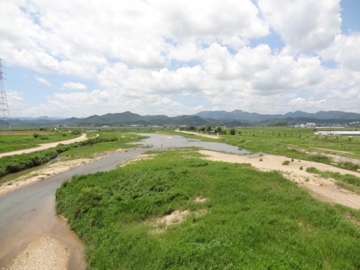 Good bye world. The dreams and the hopes you showed me were so beautiful and fragile that I will never be able to entirely reproduce in my mind. In a few months, I will look out of the window of my office in France where I used to work and ponder, whether the reality surrounding me has anything to do with the world that I saw. However, the strength and the vitality you gave me will for sure make me love the world that I continually detested. Good bye world. I will forever be grateful for you being as you are...
Good bye world. The dreams and the hopes you showed me were so beautiful and fragile that I will never be able to entirely reproduce in my mind. In a few months, I will look out of the window of my office in France where I used to work and ponder, whether the reality surrounding me has anything to do with the world that I saw. However, the strength and the vitality you gave me will for sure make me love the world that I continually detested. Good bye world. I will forever be grateful for you being as you are...
Seoul-Busan
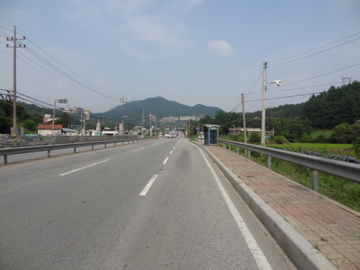 Hee Chang invited me to his place in Icheon. It was just 60km away or so. I plainly thought that it would be easy. Regarding the traffic, it was indeed incredibly easy. I have survived Central Asia and China. No country will be difficult anymore, I think. However, the geography of South Korea was not as simple as I wanted it to be. Besides the gears of my bicycle were now so used and worn, so I could not accelerate so much. I must change it in the next big city. I don't know why I didn't do it in Seoul although I was always conscious of this problem...
Hee Chang invited me to his place in Icheon. It was just 60km away or so. I plainly thought that it would be easy. Regarding the traffic, it was indeed incredibly easy. I have survived Central Asia and China. No country will be difficult anymore, I think. However, the geography of South Korea was not as simple as I wanted it to be. Besides the gears of my bicycle were now so used and worn, so I could not accelerate so much. I must change it in the next big city. I don't know why I didn't do it in Seoul although I was always conscious of this problem...
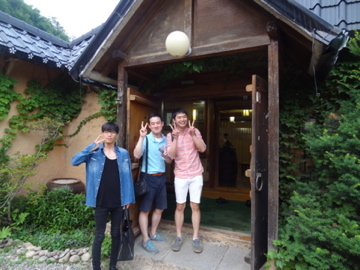 Icheon was a very small city so it was very easy for me to find Heechang's house. The thing was in Seoul there was no one who seemed to be interested in my bicycle but the people looked stupefied when they saw my fully charged bicycle. This region seems to be kept from cyclists because usually they follow the Han to go to Busan. Nice to see such an unexplored place!
Icheon was a very small city so it was very easy for me to find Heechang's house. The thing was in Seoul there was no one who seemed to be interested in my bicycle but the people looked stupefied when they saw my fully charged bicycle. This region seems to be kept from cyclists because usually they follow the Han to go to Busan. Nice to see such an unexplored place!
In this small town, there were two friends of Heechang, who spoke actually Japanese. The guy on the left side, Bumjin, was completely into the Otaku culture, which he said himself. But usually the real otakus are even themselves not aware of being otakus so maybe it's not that serious in his case...
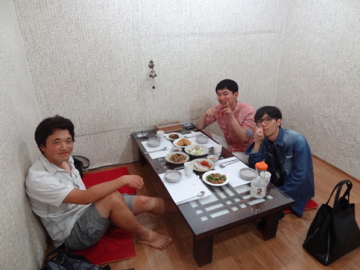 Since I had tasted the Korean BBQ the previous day, Heechang wanted to show me another aspect of the culinary culture of Korea. This looked pretty much the Japanese style but they have certainly many things in common, I suppose.
Since I had tasted the Korean BBQ the previous day, Heechang wanted to show me another aspect of the culinary culture of Korea. This looked pretty much the Japanese style but they have certainly many things in common, I suppose.
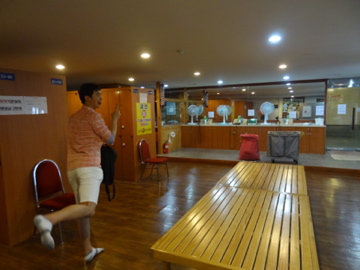 You might know Japanese onsen but there is something similar in Korea, too, though in case of Korea the hot springs are not found everywhere. Icheon was so to speak one of the miracle spots. If you are German you probably do not have too many problems but if you are French, you might be a bit disturbed because all the people are completely naked there (which was actually the reason why I didn't take a photo inside...) The cool thing is, you can not only enjoy the onsen, but there is something called Jjimjilpang upstairs, which is a collection of different types of sauna, though the temperatures are much lower and you go there with clothes on. And usually people are lying in or outside these saunas. Actually this Jjimjilpangs are open 24/7 and costs only 10 dollars or so, so many Korean young people go there if they don't want to take a real hotel.
You might know Japanese onsen but there is something similar in Korea, too, though in case of Korea the hot springs are not found everywhere. Icheon was so to speak one of the miracle spots. If you are German you probably do not have too many problems but if you are French, you might be a bit disturbed because all the people are completely naked there (which was actually the reason why I didn't take a photo inside...) The cool thing is, you can not only enjoy the onsen, but there is something called Jjimjilpang upstairs, which is a collection of different types of sauna, though the temperatures are much lower and you go there with clothes on. And usually people are lying in or outside these saunas. Actually this Jjimjilpangs are open 24/7 and costs only 10 dollars or so, so many Korean young people go there if they don't want to take a real hotel.
 I knew the drinking culture of Korea pretty well but in the end, we didn't drink alcohol at all, which we all regretted more or less. Well, I'm sure that I'm coming back to Korea again so it's not really a tragedy, I think. The following morning anyway, it was raining... Korea was in the middle of the rainy season, I don't know until when. Lonlely Planet also explicitly says that it's not fun to go there these months. Anyway, it stopped at noon so I eventually decided to depart.
I knew the drinking culture of Korea pretty well but in the end, we didn't drink alcohol at all, which we all regretted more or less. Well, I'm sure that I'm coming back to Korea again so it's not really a tragedy, I think. The following morning anyway, it was raining... Korea was in the middle of the rainy season, I don't know until when. Lonlely Planet also explicitly says that it's not fun to go there these months. Anyway, it stopped at noon so I eventually decided to depart.
Before the departure, there was one surprising present from Hee Chang. In fact, Hee Chang traveled in Europe using couch surfing. And as in Japan, couch surfing is not very popular in Korea yet, probably because the people are still afraid of meeting people without knowing them in advance. So, after his trip, Hee Chang published one book half a year ago and it has sold more than 3000 copies so far. I got the original version from him. What a nice action! I'm still not sure whether I'm going to write a book. I still prefer to talk but the effect of traveling around the world with couch surfing as a Japanese might be considerable. Well, I'm going to think of that on the way. This book from Hee Chang was written in Korean. It's going to be a good motivation to read in Korean which I cannot really do (I usually don't know how to write what I'm saying in Korean...)
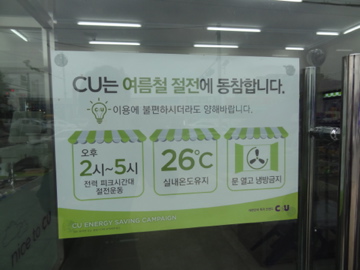 Anyway, I started. It was slightly less hilly this time butstill it was not very easy to cycle.
Anyway, I started. It was slightly less hilly this time butstill it was not very easy to cycle.
Koreans think of the environment a lot. This was also probably the reason why they suddenly started to use bicycles everywhere. I know some Koreans in my age who don't even know how to cycle so it must have been quite abrupt. One convenience store had this poster as an environmental campaign (the first picture says "save energy in the peak hours of 2pm to 5pm" the second is I think clear and the third one is "turn off the AC while the door open"). It's nice that the Korean quality can be seen here, too :) (the "cu" of "cu energy saving campaign" is the name of the convenience store. Don't be too startled :)
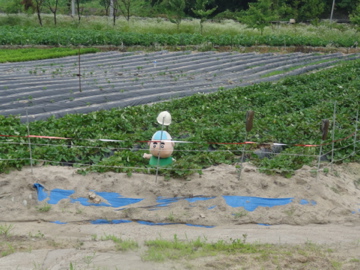 For the rest of the day, I thought the weather would stay more or less stable, until I had to go through one cloudburst. In Japan, it's usually more like it's raining all the time and there's no explosive moment but the rainy season of Korea seems to be always like this.
For the rest of the day, I thought the weather would stay more or less stable, until I had to go through one cloudburst. In Japan, it's usually more like it's raining all the time and there's no explosive moment but the rainy season of Korea seems to be always like this.
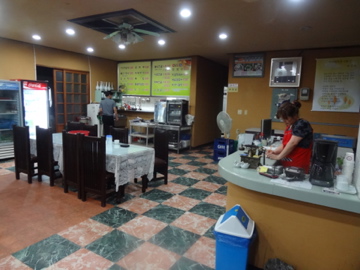 I was thinking to take a Jjimjilpang somewhere on the way in the evening but I could not arrive in a big city at all. There were some motels on the way but I found it a bit stupid to stay there (just in case: a motel is not a brothel in Korea)
I was thinking to take a Jjimjilpang somewhere on the way in the evening but I could not arrive in a big city at all. There were some motels on the way but I found it a bit stupid to stay there (just in case: a motel is not a brothel in Korea)
So, eventually I was forced to stay in my tent, which was not a very bad option as the temperature was not as high as it was in China. Outside of any kind of civilization, I asked in one restaurant, whether I can put my tent in front of it. They were like "hey! you don't need a tent. Come inside!" Aha? This was something that I hadn't expected from Korea at all because I can hardly imagine this kind of situation in Japan and there's little difference in my eyes between Korea and Japan.
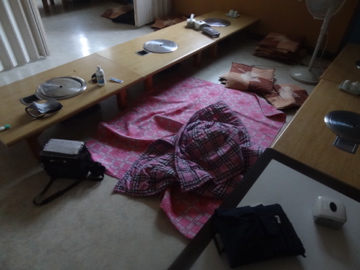 Since it was a restaurant, I also could have dinner. Before going to bed, I was watching TV. I noticed that there is no dubbing there, only subtitles. And whenever there are people in the news, not related to the current topic, this part is completely frosted so that they cannot be seen, like when they are showing a picture of a street with a lot of people or so. I don't know how important it is but this type of care is fairly prevalent in Japan, too, though I don't think this happens in China.
Since it was a restaurant, I also could have dinner. Before going to bed, I was watching TV. I noticed that there is no dubbing there, only subtitles. And whenever there are people in the news, not related to the current topic, this part is completely frosted so that they cannot be seen, like when they are showing a picture of a street with a lot of people or so. I don't know how important it is but this type of care is fairly prevalent in Japan, too, though I don't think this happens in China.
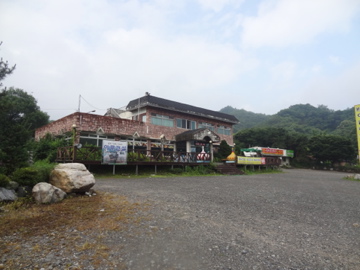 I just put the photo of the place once again. It almost looked like a ghost house in the previous night but it's actually a very nice building. The weather was also getting better there.
I just put the photo of the place once again. It almost looked like a ghost house in the previous night but it's actually a very nice building. The weather was also getting better there.
On the way, I could sometimes stop at convenience stores or in front of cafés to use the internet. It is actually very easy to find an open internet in Korea. The people of course know that other people might use it but they don't care. It is, after all, not doing any harm to them if someone uses it there for some minutes. It was a great help for me because my German phone did not work in Korea at all (later I found out that WCDMA was turned off. I don't know when and where I did it...)
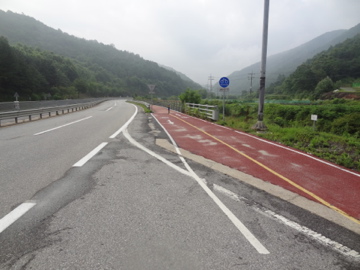 The infrastructure is extremely good in Korea. Sometimes even too good. As there is almost no one in the middle of Korea, I encountered a car maybe every five minutes or so? It was very calm during the whole day. And in a country where it is also extremely safe to cycle in the capital, I can do whatever acrobatics in the middle of the street and nothing happens. And in these circumstances, I was shocked to see a road for cyclists. I did not use it there because typically this kind of cycle road goes to somewhere else, but it stayed there I don't know for how many kilometers. I personally find it superfluous but I'm also a crazy guy to cycle on the highway in China and Koreans are maybe really serious about it.
The infrastructure is extremely good in Korea. Sometimes even too good. As there is almost no one in the middle of Korea, I encountered a car maybe every five minutes or so? It was very calm during the whole day. And in a country where it is also extremely safe to cycle in the capital, I can do whatever acrobatics in the middle of the street and nothing happens. And in these circumstances, I was shocked to see a road for cyclists. I did not use it there because typically this kind of cycle road goes to somewhere else, but it stayed there I don't know for how many kilometers. I personally find it superfluous but I'm also a crazy guy to cycle on the highway in China and Koreans are maybe really serious about it.
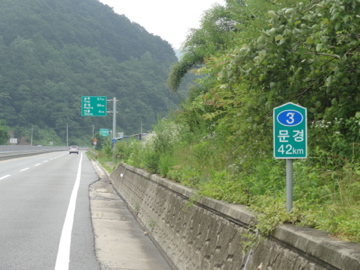 I think in Korea the distance to one city is defined as the distance to the city hall of the city, which is in fact a very nice idea (not like in Italy...) and it's quite consistent. However, there are two types of signs. One is the big board like in the back of the photo (this one I think is usually the city hall) and the one at the side of the road (I don't know how this one works) and sometimes they have a significant difference. Clearly, in this photo, I can see that there isn't a 4km difference between these two plates.
I think in Korea the distance to one city is defined as the distance to the city hall of the city, which is in fact a very nice idea (not like in Italy...) and it's quite consistent. However, there are two types of signs. One is the big board like in the back of the photo (this one I think is usually the city hall) and the one at the side of the road (I don't know how this one works) and sometimes they have a significant difference. Clearly, in this photo, I can see that there isn't a 4km difference between these two plates.
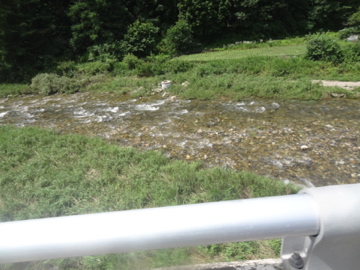 It was a very lovely sunny day. And you must know how beautiful Korea actually is. Particularly the water of the rivers. I don't know exactly where it's coming from but in such a mountainous country I don't think it has any pollution. Korea is anyway not a polluted country. Koreans complain about the air quality of Seoul but I found it quite clean there, too.
It was a very lovely sunny day. And you must know how beautiful Korea actually is. Particularly the water of the rivers. I don't know exactly where it's coming from but in such a mountainous country I don't think it has any pollution. Korea is anyway not a polluted country. Koreans complain about the air quality of Seoul but I found it quite clean there, too.
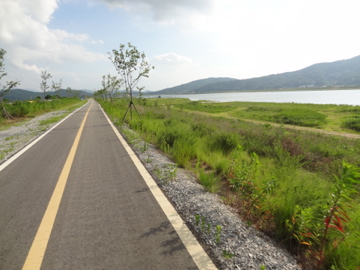 The only one difficulty was with restaurants or shops. The road I took was not going through any village/town/city, even though it was not a highway. It's not a bad idea since this way, the people can completely avoid any kind of noise coming from the cars from outside. Anyway, I could find a place at 4pm to have lunch and could go further.
The only one difficulty was with restaurants or shops. The road I took was not going through any village/town/city, even though it was not a highway. It's not a bad idea since this way, the people can completely avoid any kind of noise coming from the cars from outside. Anyway, I could find a place at 4pm to have lunch and could go further.
Just before this late lunch, I found out that there was a very nice-looking cycle road at a broad river. I just thought like "hey, cool! Maybe I can cycle alongside the river up to Busan!". The problem was, there was no way to enter this cycle road for tens of kilometers, even though it was running just next to the road I was on.
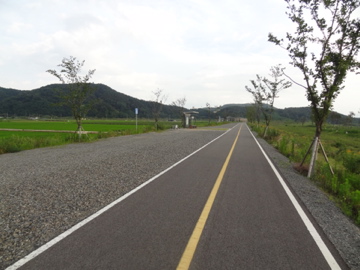 It looked like it was built recently. I found it extremely nice, but the way of building it appeared, to be honest, a little bit weird to me. As you see on the photos, there was simply no one on this road, even though it was a sunny day. Maybe the popularity is now getting more and more so it was an investment for the future? It was also quite difficult to get food supply on the way because all the cities were fairly far away from this road and it was not like I could leave the cycle road to go to a city and join it again after the city. It was more like I had to come back to the point again because there were really not so many possible exits/entries. Another weird thing was, this road sometimes goes up and down, pretty much without a reason. So I found it extremely difficult to cycle with all the luggage I had on my bicycle. It looked almost like it was built by someone who had never cycled before. Well, for sporty mountain bikers it probably doesn't matter so much
It looked like it was built recently. I found it extremely nice, but the way of building it appeared, to be honest, a little bit weird to me. As you see on the photos, there was simply no one on this road, even though it was a sunny day. Maybe the popularity is now getting more and more so it was an investment for the future? It was also quite difficult to get food supply on the way because all the cities were fairly far away from this road and it was not like I could leave the cycle road to go to a city and join it again after the city. It was more like I had to come back to the point again because there were really not so many possible exits/entries. Another weird thing was, this road sometimes goes up and down, pretty much without a reason. So I found it extremely difficult to cycle with all the luggage I had on my bicycle. It looked almost like it was built by someone who had never cycled before. Well, for sporty mountain bikers it probably doesn't matter so much
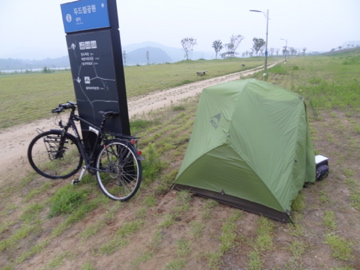 There was still a good aspect on the otherside, too: there were plenty of places to put a tent. I just chose one place on the riverbank.
There was still a good aspect on the otherside, too: there were plenty of places to put a tent. I just chose one place on the riverbank.
I was thinking to write this blog, when I opened the computer. And I found out, I had the internet there. I was in the middle of nowhere. I had no idea why I had the internet there but anyway it was there. Too cool!
In the night, however, I had a very strong stomachache and I couldn't sleep anymore. I got out of the tent and the extreme nausea came to me. I vomited for a while until I felt a little bit better. I don't know where it was coming from but I think it was a sandwich that I bought from the convenience store nearby. I didn't know this chain before but now I know at least which ones I would not use anymore... The rest of the night was nasty, as I felt hardly better than before I vomited.
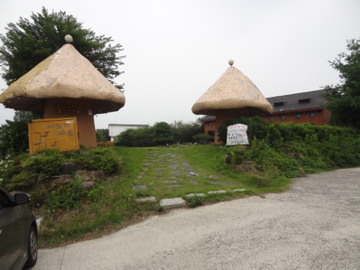 Following day, not only I felt horrible, but the weather was unpleasant, too. This was something that had been expected before and luckily enough, it never rained too long. Whenever it started to rain, I stayed under a bridge or in a café. There are really a lot of cafés in Korea. Wonderful!
Following day, not only I felt horrible, but the weather was unpleasant, too. This was something that had been expected before and luckily enough, it never rained too long. Whenever it started to rain, I stayed under a bridge or in a café. There are really a lot of cafés in Korea. Wonderful!
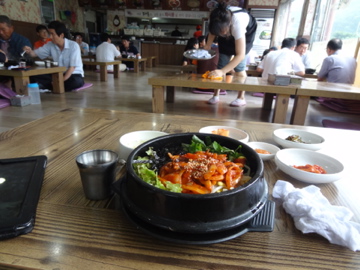 The situation that the cycle road was very far away from the normal civilization did not change that much on this day. When I wanted to have lunch, I had to take a very long road to go to a city. And fortunately enough, I could have a bibimbap again. I'm not a kind of person who really enjoys eating (did I mention?) but bibimbap is different. I'm sure that this wave will come to Europe in the near future.
The situation that the cycle road was very far away from the normal civilization did not change that much on this day. When I wanted to have lunch, I had to take a very long road to go to a city. And fortunately enough, I could have a bibimbap again. I'm not a kind of person who really enjoys eating (did I mention?) but bibimbap is different. I'm sure that this wave will come to Europe in the near future.
After this restaurant, I definitely left the cycling road, because it was anyway very safe everywhere in Korea and especially I wanted to see more Korean stuff and not only the nature. At the same time, I also wanted to make advance a little bit faster since I felt quite sick for the entire day.
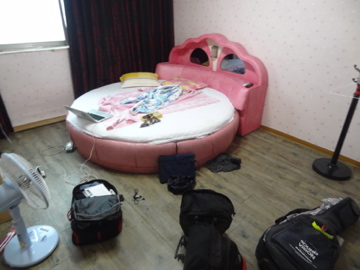 I arrived in a small city in the evening and took a room in a hotel. It was not very cheap and there was no internet there, but I really needed a good rest in this moment. Besides, it started to rain very hard in the evening. I don't think I would have been able to stay in my tent just like this. I could use the internet in a café nearby. When I ordered milk tea, they brought milk. Well, I needed the internet so this was not very important anyway... The owner was a very friendly guy, as many Koreans indeed are :)
I arrived in a small city in the evening and took a room in a hotel. It was not very cheap and there was no internet there, but I really needed a good rest in this moment. Besides, it started to rain very hard in the evening. I don't think I would have been able to stay in my tent just like this. I could use the internet in a café nearby. When I ordered milk tea, they brought milk. Well, I needed the internet so this was not very important anyway... The owner was a very friendly guy, as many Koreans indeed are :)
I think somewhere on the previous day my luck left me and did not want to come back for an entire day: when I got up, I found out that my bicycle was deliberately put outside the building, leaving all my stuff in the rain. I took valuable items with me so there was no problem with my computer etc. but my sleeping bag was completely wet, weighing probably several kg... In the end, I decided to abandon it. After all, I had two of them and the other one fortunately was in my room.
Nevertheless, I don't take all the stuff so bad since nothing hostile happened in person. I'm sure that things like this are absolutely possible in Europe/Japan. I was just out of my luck, I'd estimate.
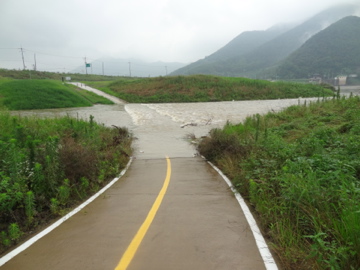 The effect of the heavy rain of the previous day was tremendous. I don't know what this should look like usually but when I was there it was at least 1m deep. However, this kind of stuff does not present too many problems in Korea since wherever problems might arise, there are always solutions indicated.
The effect of the heavy rain of the previous day was tremendous. I don't know what this should look like usually but when I was there it was at least 1m deep. However, this kind of stuff does not present too many problems in Korea since wherever problems might arise, there are always solutions indicated.
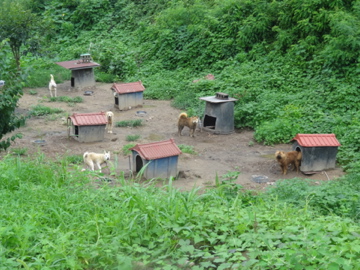 I came back to the cycling road again and as before, there was pretty much no one there, neither civilization, just nature and some houses.
I came back to the cycling road again and as before, there was pretty much no one there, neither civilization, just nature and some houses.
And in a forest, there was one house with several dogs outside, all chained. I know that Koreans eat dogs but I don't know how often they do it. Maybe in a place like this it is still very common.
I met one guy on the way who spoke good English. Phonetically, there is no sound for "f" in Korean. I asked him whether it's difficult to pronounce f for him:
"No, it's not dippicult. Why?"
... I think it was more difficult than he thought...
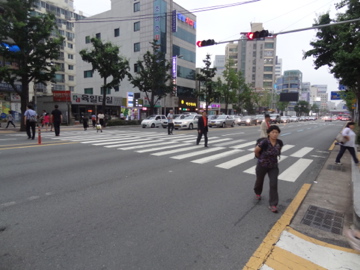 And after four days, I finally arrived in Busan. Busan is by the way the second biggest city of Korea and culturally fairly distinct from Seoul. People in Seoul told me the people in Busan speak a very different dialect. I don't know how different it is but it appeared quite similar to that of Seoul to me.
And after four days, I finally arrived in Busan. Busan is by the way the second biggest city of Korea and culturally fairly distinct from Seoul. People in Seoul told me the people in Busan speak a very different dialect. I don't know how different it is but it appeared quite similar to that of Seoul to me.
The old part of Busan is in the north and if you arrive there from Seoul for example, you must go through mountains. There is a long tunnel for cars but it's forbidden for bicycles. I will for sure discuss this issue somewhere apart from here but this kind of interdiction exists when it's too dangerous for you and not for others. So, if you know you are going to be cautious, it should be okay. And in a trip like this it's always important to know why some stuff is forbidden. And actually there were police at the exit (accidentally) but they did not mention anything.
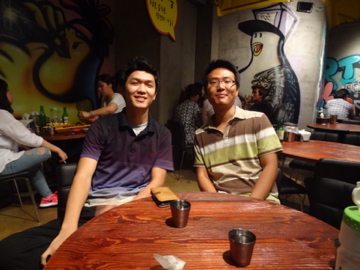 I knew about where to go to see my host, Jay. And when I was nearby, I just turned on the wi-fi and of course I had the internet there, as always in Korea.
I knew about where to go to see my host, Jay. And when I was nearby, I just turned on the wi-fi and of course I had the internet there, as always in Korea.
Jay traveled around the world last year, starting in August (only one month before me) and he had just come back to Korea last month. Actually there's an offer from the Swiss airlines (other airlines might have the same thing) which allows to fly to one continent once, totaling five flights for a fixed price. I don't know how much he paid but it's always a problem to book a one way flight to another continent (because if the passenger cannot enter the country, it's the flight company who must take the responsibility to take him/her back, which is the reason why you never pay half the original price when you book a one way ticket) so it's a pretty good idea.
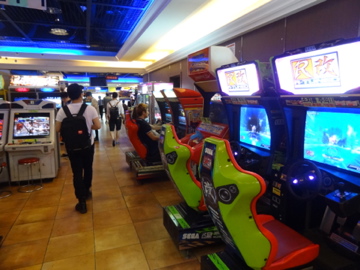 The modern culture of Korea made me think of Japan a lot. We were waiting for one of Jay's friend and I walked around a little bit. There was one big arcade center nearby. There were some arcade centers in China as well but they looked much older. Here in Korea, they had probably the same machines as in Japan, though much cheaper there (just a quarter of what you pay in Japan). I just wondered how Koreans deal with the language since there was obviously no translation for most of the machines... Maybe this is the reason why there are so many Koreans who understand Japanese :)
The modern culture of Korea made me think of Japan a lot. We were waiting for one of Jay's friend and I walked around a little bit. There was one big arcade center nearby. There were some arcade centers in China as well but they looked much older. Here in Korea, they had probably the same machines as in Japan, though much cheaper there (just a quarter of what you pay in Japan). I just wondered how Koreans deal with the language since there was obviously no translation for most of the machines... Maybe this is the reason why there are so many Koreans who understand Japanese :)
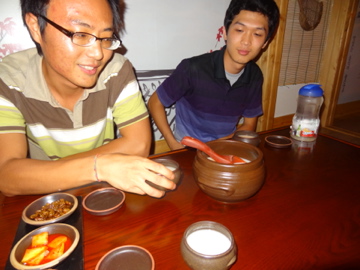 Koreans drink a lot. I know it from Germany. And I knew a lot of stuff but eventually I didn't have an opportunity anywhere. However, this guy, Jay, was quite a boozer, together with the fact that he's jobless at the moment. And it was a Friday, which was another good reason to go drinking.
Koreans drink a lot. I know it from Germany. And I knew a lot of stuff but eventually I didn't have an opportunity anywhere. However, this guy, Jay, was quite a boozer, together with the fact that he's jobless at the moment. And it was a Friday, which was another good reason to go drinking.
The white stuff is something called Makkori, if I didn't miss spell it. Actually it was already the second round and I was pretty drunk so I don't know anymore what it tasted like exactly but I think it tasted as it looks (which is actually not really an explanation...)
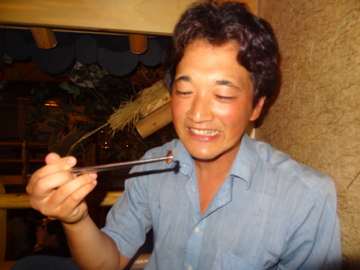 Koreans eat many different things, such as dogs cats etc. Something I didn't expect to be in the bar was silkworms... Japanese used to eat them like a century ago (which I learnt from the history class) but Koreans still eat them. Of course it was the first time for me to taste it. I would say, it didn't have any taste. By the way, if you say "it does not have a taste" in Korean literally, it means "it tastes bad". You must say "it does not have ANY taste". So confusing...
Koreans eat many different things, such as dogs cats etc. Something I didn't expect to be in the bar was silkworms... Japanese used to eat them like a century ago (which I learnt from the history class) but Koreans still eat them. Of course it was the first time for me to taste it. I would say, it didn't have any taste. By the way, if you say "it does not have a taste" in Korean literally, it means "it tastes bad". You must say "it does not have ANY taste". So confusing...
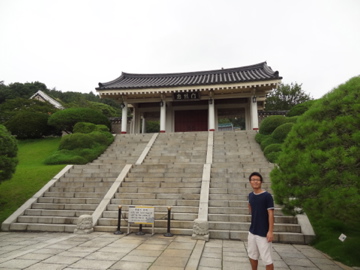 There was another round in a different bar (three bars in total... I was dying). Fortunately, the ship for Japan was in the evening. So we slept like until noon and strolled around the city together. As Busan is the second biggest city in Korea, it has also a long history and culture there. This very nice Buddhist (?) temple, for example. Things like this are everywhere in the city, just as in Japan, immersed in the middle of the local culture.
There was another round in a different bar (three bars in total... I was dying). Fortunately, the ship for Japan was in the evening. So we slept like until noon and strolled around the city together. As Busan is the second biggest city in Korea, it has also a long history and culture there. This very nice Buddhist (?) temple, for example. Things like this are everywhere in the city, just as in Japan, immersed in the middle of the local culture.
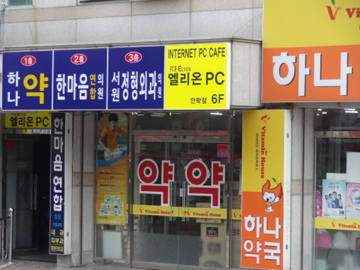 There's something that I personally call "bookstore dating" in Japan. Especially young couples go to a bookstore for dating. This is quite characteristic for Japan since there are so many bookstores and the people are relatively interested in books. In Korea, on the other hand, there's internet café dating. There are sometimes spaces for couples in the internet cafés and I don't know what they do but they can use them to date. Welcome to Korea :)
There's something that I personally call "bookstore dating" in Japan. Especially young couples go to a bookstore for dating. This is quite characteristic for Japan since there are so many bookstores and the people are relatively interested in books. In Korea, on the other hand, there's internet café dating. There are sometimes spaces for couples in the internet cafés and I don't know what they do but they can use them to date. Welcome to Korea :)
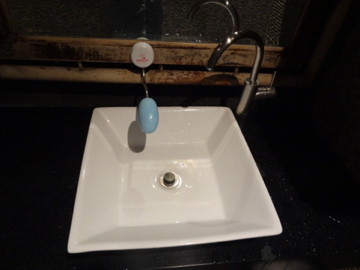 I know that Japanese people hate to touch anything at the toilet. The Koreans have apparently the same habitude. The light blue object over the sink is a soap, a very normal one, but suspended by a stick so that you don't need to touch anything else. I don't know how important it is...
I know that Japanese people hate to touch anything at the toilet. The Koreans have apparently the same habitude. The light blue object over the sink is a soap, a very normal one, but suspended by a stick so that you don't need to touch anything else. I don't know how important it is...
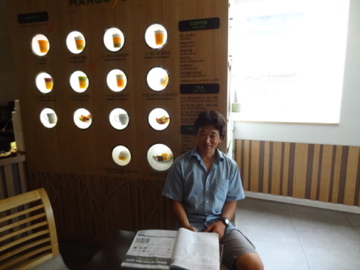 Busan had a little bit different atmosphere than Seoul. It was more like an old city, just like Tokyo and Osaka. But still there was a lot of modern stuff, like cafés for example. Just as Japanese ones, they do not offer a cup of simple coffee, but elaborated parfaits, in a tiny very nice space. They are quite different from the ones in Europe but I like them both.
Busan had a little bit different atmosphere than Seoul. It was more like an old city, just like Tokyo and Osaka. But still there was a lot of modern stuff, like cafés for example. Just as Japanese ones, they do not offer a cup of simple coffee, but elaborated parfaits, in a tiny very nice space. They are quite different from the ones in Europe but I like them both.
In the afternoon, I went to the port and took a boat for Shimonoseki. All the staff were Korean but they all spoke excellent Japanese. I just had to hand over my bicycle and take my stuff on my own but otherwise everything was much more smooth than in Qingdao, probably because Koreans and Japanese do not need a visa when going to each other's country. It's a very nice feature between these two countries.
These were the days in Korea. Maybe I've written somewhere above but Korea was the country I was looking forward to the most. And I have to say that it did not deceive my expectations, but at the same time I could not know the country so well, as I could see only two big cities, Seoul and Busan. The very strange construction of cycling roads made it hardly possible to know what's going on in the rest of the country. I really hope they will make something more useful out of it.
There's just one thing I have to mention about Korea: the nationalism. I did not quite realize that there was such a strong feeling for their country. And I know that it's not doing so much good for themselves, either, since the rest of the world now dislikes it. I know for example a friend of mine, whom I know for four years now. She left a comment on facebook, saying the islands between Korea and Japan belong to Korea. I don't take any position on this issue but in general, it appeared too stupid to talk about islands no one lives on in the personal life, anyway not constructive if you just try to confiscate it. And I know that she made a very bad reputation of Korea by doing it.
This was what I vaguely thought at that time. However, we all have to realize that Korea is the smallest country in the Far East Asia, with the GDP merely one fifth of that of Japan. What a threat Japan in reality is... Not only I, but many people in Japan are not aware of this problem. Anyway, the Korean nationalism certainly exists, but it has surely been imposed by the presense of other countries, which made even Koreans believe that Korea will forever not cooperate with other Far Eastern countries. I just want to see, if it's true. If ever Japanese can apologize, which is not very probable, I namely think that Koreans are ready to accept it. And surely I am not the only one who is looking forward to it.
Busan-Shimonoseki-Miyajima
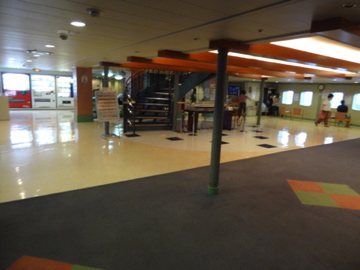 I had to be at the port eight hours in advance in Qingdao. The control in Busan was undeniably uncomplicated. I just had to be there one hour in advance and had to show them the passport. No one needed a visa, so it cannot be that complicated anyway. Since my bicycle was not there, I did not have to be so detached. The ship itself was a little bit like the one from Qingdao, splendid.
I had to be at the port eight hours in advance in Qingdao. The control in Busan was undeniably uncomplicated. I just had to be there one hour in advance and had to show them the passport. No one needed a visa, so it cannot be that complicated anyway. Since my bicycle was not there, I did not have to be so detached. The ship itself was a little bit like the one from Qingdao, splendid.
Before checking in, I had to hand over my gas cartridges, where they told me: "They might explode on the ship." What they did NOT say was: "They might explode, because you might be a terrorist." This was pretty much the mentality of the Japanese authority, just as the German one.
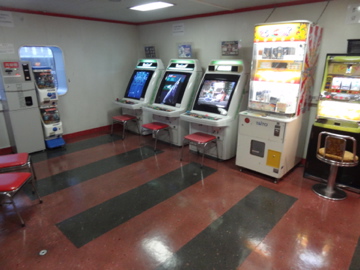 And of course I was on the way to Japan. Starting from the politeness of the people, I could exceptionally sense the atmosphere of Japan on this ship. And of course, there are arcade games.
And of course I was on the way to Japan. Starting from the politeness of the people, I could exceptionally sense the atmosphere of Japan on this ship. And of course, there are arcade games.
The passport control was much faster than in Seoul. It was a very strange feeling that I could perfectly understand what other people were talking about. During the whole trip, I always thought I would have a very special feeling when I arrive in Japan, but this, in reality, did not occur to me at all. The moment I entered Korea was much more special. Maybe because Korea and Japan share a lot of things. Anyway, it was not that bad that I could talk with the police officers there, who haven't had so much experience with such a tourist. Fascinating.
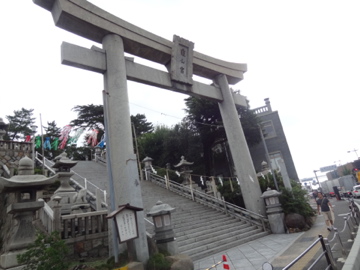 Left traffic, for the first time in this entire trip, which was not as hard as I was initially imagining. Only it's not very practical when you are cycling on the south side of Japan going from the west to the east because you cannot see the ocean so well... Fortunately (and unfortunately simultaneously), the streets are quite narrow in Japan because of harsh geography. It's almost a wonder that they could still create streets at the first place.
Left traffic, for the first time in this entire trip, which was not as hard as I was initially imagining. Only it's not very practical when you are cycling on the south side of Japan going from the west to the east because you cannot see the ocean so well... Fortunately (and unfortunately simultaneously), the streets are quite narrow in Japan because of harsh geography. It's almost a wonder that they could still create streets at the first place.
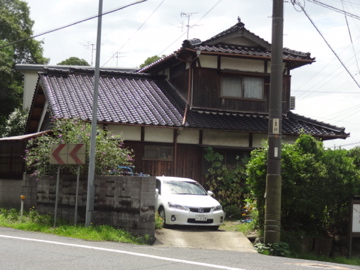 The infrastructure here in Japan was extremely good, which of course is not a very big surprise. However, I was feeling something quite strange while cycling but at first I was not aware of what it was. There were as many cars as in China or Korea but something was completely different.
The infrastructure here in Japan was extremely good, which of course is not a very big surprise. However, I was feeling something quite strange while cycling but at first I was not aware of what it was. There were as many cars as in China or Korea but something was completely different.
When I turned on my iPod it suddenly snuck up on me: it was silent, even though there were a lot of cars. I heard once that the people here change their cars every 3 or 4 years. I don't know exactly why, but this surely drastically reduces the noise. And it's probably also due to the material of the streets. I cannot really say what kind of material they were using but I could feel difference to what I had experienced so far.
So the houses might be old but the cars are always very new, which makes a very strange view of a lexus in front of a wooden house.
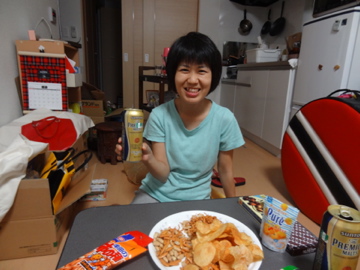 Japan is a very famous country for not being couchsurfing friendly (which I can imagine very well). I could, however, find a host, Kumiko, in the very first city, Ube. It was only 40km away from the harbour city, Shimonoseki. I just did not know how tired I would be when I arrive in Japan because it was the first time to travel by ship to Japan. I was not tired at all but it was also extremely hot, so probably it was also good that I did not cycle too much on the first day.
Japan is a very famous country for not being couchsurfing friendly (which I can imagine very well). I could, however, find a host, Kumiko, in the very first city, Ube. It was only 40km away from the harbour city, Shimonoseki. I just did not know how tired I would be when I arrive in Japan because it was the first time to travel by ship to Japan. I was not tired at all but it was also extremely hot, so probably it was also good that I did not cycle too much on the first day.
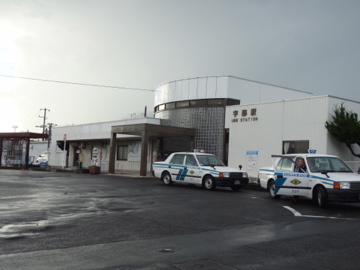 Ube is supposed to be a main station. I told Kumiko that I would be in a café in front of it. It turned out that actually there was pretty much nothing there. Even no restaurant. Kumiko had told me her apartment is near the station. "Near something" might mean up to a kilometer in Japan, at least in Tokyo. I found out that it was quite in front of the station. I did not know that the situation was that different in a different part of Japan...
Ube is supposed to be a main station. I told Kumiko that I would be in a café in front of it. It turned out that actually there was pretty much nothing there. Even no restaurant. Kumiko had told me her apartment is near the station. "Near something" might mean up to a kilometer in Japan, at least in Tokyo. I found out that it was quite in front of the station. I did not know that the situation was that different in a different part of Japan...
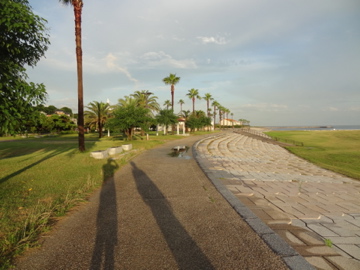 Fortunately it was Sunday when I arrived there. Kumiko was simply waiting for me at her place. I have not been hosted by many girls and she was a kind of typical very very polite Japanese. I was supposed to use polite language with her but it'd been quite a while for me... I think I've got some practice to do when I'm back at home.
Fortunately it was Sunday when I arrived there. Kumiko was simply waiting for me at her place. I have not been hosted by many girls and she was a kind of typical very very polite Japanese. I was supposed to use polite language with her but it'd been quite a while for me... I think I've got some practice to do when I'm back at home.
We went to the sea nearby. The other side of Japan has a lot of beautiful coasts but not this side. The beach was at least well constructed.
If you go to Japan, be sure that you have a credit card which you can draw money with. Only banks are authorized to change money and my card, Maestro, could not be accepted by all of the ATM's. I changed 100 dollars but the rate was quite bad.
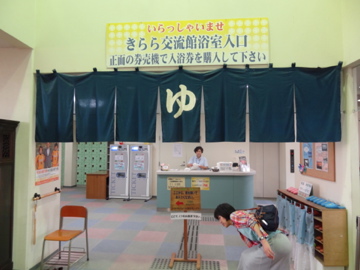 There was otherwise nothing in Ube. Consequently, there are not many couchsurfers coming to Kumiko's place to see this region, but more like they have a Japan Railway Pass (which allows you to use almost all the trains of Japan Railway) and they go to Kyushu etc.
There was otherwise nothing in Ube. Consequently, there are not many couchsurfers coming to Kumiko's place to see this region, but more like they have a Japan Railway Pass (which allows you to use almost all the trains of Japan Railway) and they go to Kyushu etc.
The only one interesting thing was the local sento (of which of course I could not take a photo because everyone is naked inside...). You must couch surf to enjoy things like this in Japan. There's no explanation, no description in English. Even for me, it would have been difficult to find it probably.
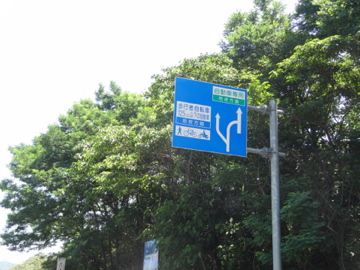 Next day, the weather was extremely good, as the first day in Japan. Japan is crowded mostly in the eastern part, especially between Osaka and Tokyo. The region around Shimonoseki is "relatively" empty. However, I found out that there were still highways where bicycles were forbidden to pass through. The cool fact was that, (outside Tokyo) the streets are always available for everyone in Japan. In other parts of the world I have experienced dead ends several times, that did not have any indication of where to make a detour. Nice thing.
Next day, the weather was extremely good, as the first day in Japan. Japan is crowded mostly in the eastern part, especially between Osaka and Tokyo. The region around Shimonoseki is "relatively" empty. However, I found out that there were still highways where bicycles were forbidden to pass through. The cool fact was that, (outside Tokyo) the streets are always available for everyone in Japan. In other parts of the world I have experienced dead ends several times, that did not have any indication of where to make a detour. Nice thing.
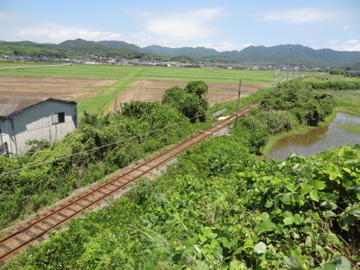 Korea was quite mountaneous but I think Japan is even more. And this country has the highest forest concentration of all the countries I have visited in my life. Accordingly, it's not quite easy to develop the infrastructure here, which leads to such a tricky railway. This is probably even better than some other parts of Japan since the trains might pass through houses or whatever, taking some stuff from the balcony sometimes.
Korea was quite mountaneous but I think Japan is even more. And this country has the highest forest concentration of all the countries I have visited in my life. Accordingly, it's not quite easy to develop the infrastructure here, which leads to such a tricky railway. This is probably even better than some other parts of Japan since the trains might pass through houses or whatever, taking some stuff from the balcony sometimes.
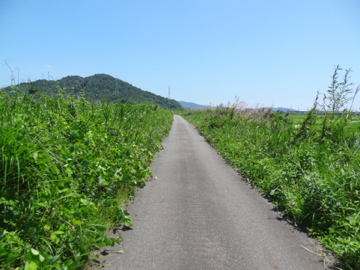 At least, in contrast to the environment of China, the sky was incredibly clear (I did not have very good weather in Korea either. Probably I was not lucky enough, I suppose).
At least, in contrast to the environment of China, the sky was incredibly clear (I did not have very good weather in Korea either. Probably I was not lucky enough, I suppose).
Japan is not a country which wants to decorate streets (not only streets, but you can see many tasteless buildings.) This cyclist road, for example, was just existing there. It was extremely practical that it was there as it was entirely separated from the highway. I just think it would be quite unusual in other countries.
I wanted to arrive in Miyajima on this day, because there was a famous hotel there, with a lot of foreign guests. I arrived at 9pm and I saw that there was a party going on. The guests there stay there for weeks. At the end of the day, I was tooooooooooo tired to do anything. I could not even remove my contact lenses. It's really a pity that I did not take a photo there.
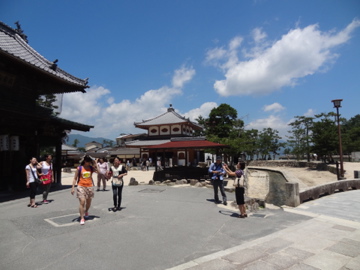 Following day, I walked on the island of Miyajima with a German guy and a Japanese girl (with a lot of difficulties in communication).
Following day, I walked on the island of Miyajima with a German guy and a Japanese girl (with a lot of difficulties in communication).
On this day, I heard for the first time that the rain season was over. And appropriately enough, the temperature shot up through the sky. We could hardly stay in the sun for more than several minutes.
It is still very nice in Japan that the culture has survived most of the historical events, which I can now recognize after my stay in China. At the same time, I could not answer a lot of questions that this German guy asked me. In contrast to the education system in Europe, we do not learn much about our own culture.
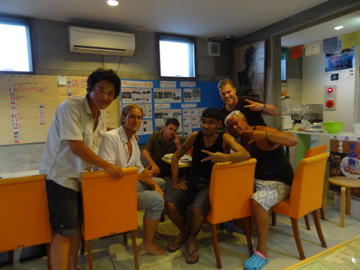 There were many things to see on Miyajima, especially the mountains just behind the shrines would have been quite interesting but I didn't have enough time. Next time I'll do everything (as I promise every time, everywhere...).
There were many things to see on Miyajima, especially the mountains just behind the shrines would have been quite interesting but I didn't have enough time. Next time I'll do everything (as I promise every time, everywhere...).
These are the members of the drinking session of the previous night. Partially I could not even remember that I was talking to them.
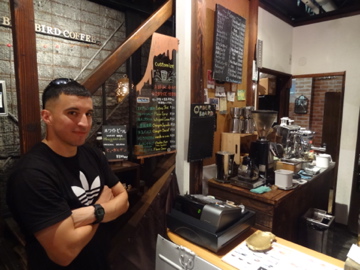 The main reason why I stayed in Miyajima on this day was actually because there was one couch surfer, Joel, who is native to the US and working for the military base in Iwakuni (which now is quite a controversial place but he was a very nice guy).
The main reason why I stayed in Miyajima on this day was actually because there was one couch surfer, Joel, who is native to the US and working for the military base in Iwakuni (which now is quite a controversial place but he was a very nice guy).
He was living alone in a huge house near Miyajima. Most of the Americans working in Iwakuni are usually living around the base but Joe apparently wanted to stay in a natural Japanese neighborhood. I could see a very good relationship between him and the neighbors, who probably never have contact with foreigners otherwise.
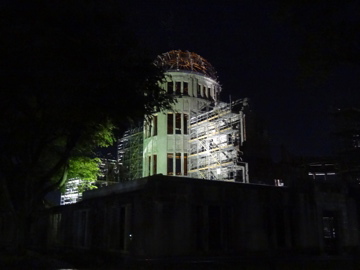 For the dinner, Joe told me that there's a good ramen restaurant in the city nearby. I simply followed his proposition, without really knowing where's the "nearby city".
For the dinner, Joe told me that there's a good ramen restaurant in the city nearby. I simply followed his proposition, without really knowing where's the "nearby city".
When we got into his Lexus and went to the highway, I was stunned to see the quality of the road. There was no decoration but it was so smooth, which I had never realized when I was living in Japan. The tradition of the highest quality was certainly there, even though most of us, Japanese citizens, are unaware of it.
A few minutes later, we arrived in the "nearby city", which, in reality, turned out to be Hiroshima. Actually it was the first time for me to be there and for all my shame, I had never seen the atomic bomb dome.
Joe also wanted to participate in the ceremony of Aug. 6th, which is the anniversary of the bombing, but he does not have the right to be even nearby. What a misery...
Miyajima-Fukuyama-Okayama-Osaka
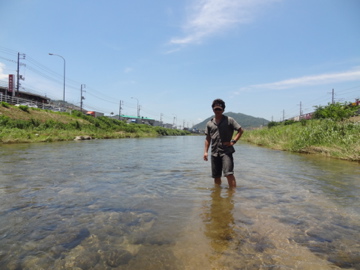 It was getting warmer and warmer in Japan. Summer. Not only summer, the Japanese summer. Endless blue sky and the noise of the cicadae. In a very strong contrast to the summer of Tokyo though, it was not as humid around Hiroshima.
It was getting warmer and warmer in Japan. Summer. Not only summer, the Japanese summer. Endless blue sky and the noise of the cicadae. In a very strong contrast to the summer of Tokyo though, it was not as humid around Hiroshima.
If you ever go to Japan by bicycle (though not easy), you will see that the rivers are extremely clean there. It's probably because Japan is quite mountaneous and therefore the rivers are steep and short. Since I was cycling alongside an unknown river, I could get inside several times to cool down my heated body.
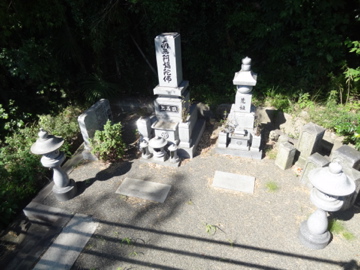 I have the feeling that Japan has the highest number of graveyards in the world. Every one of them is not very large but they are everywhere. I suppose it was also like this in China before the revolution, but now they succeeded in destroying all of this kind of stuff. Especially they (Chinese communist party) do not care how important these objects are when they want to build something modern. I know that it's not the Chinese mentality but if the government is going in a completely different direction, there aren't many things to do...
I have the feeling that Japan has the highest number of graveyards in the world. Every one of them is not very large but they are everywhere. I suppose it was also like this in China before the revolution, but now they succeeded in destroying all of this kind of stuff. Especially they (Chinese communist party) do not care how important these objects are when they want to build something modern. I know that it's not the Chinese mentality but if the government is going in a completely different direction, there aren't many things to do...
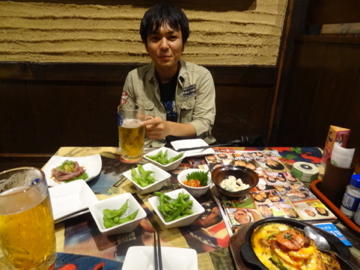 My next destination, Fukuyama, was a little bit further away than I expected. "Far away" is maybe not the right expression for what took so much time, because it was more like a cycle of "10m cycle, a minute wait at traffic light". At the sea side (especially the south-eastern coast line of Japan) is very busy. Don't expect to be able to drive as fast as the speed limit allows.
My next destination, Fukuyama, was a little bit further away than I expected. "Far away" is maybe not the right expression for what took so much time, because it was more like a cycle of "10m cycle, a minute wait at traffic light". At the sea side (especially the south-eastern coast line of Japan) is very busy. Don't expect to be able to drive as fast as the speed limit allows.
My host, Kazumasa, lived almost directly at the main station of Fukuyama. He talked to me in English first, thinking I was a foreigner. Hmmm, I didn't think that this would happen in Japan...
The drinking culture seems to be equivalent everywhere in the world. Just after I arrived there, we went to a bar. Again, drinking. How much did I drink in this entire trip?
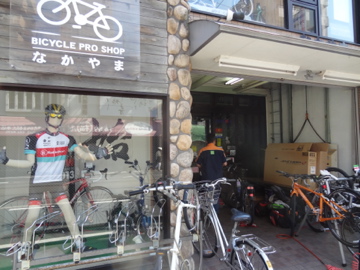 The following day was also extremely warm. Does it never rain in Japan?
The following day was also extremely warm. Does it never rain in Japan?
I did not make it clear until now but actually I had never changed the chain, the gear etc. in this entire trip. The only one things were the pedals and tires. Doesn't it sound a little bit unbelievable? Anyway, everything was quite broken. What to do? I was first planning to get back to Tokyo and then repair everything but I found it intolerable whenever there was a glitch on my bicycle. When I arrived in Okayama, therefore, I decided to find a good bicycle shop to change everything.
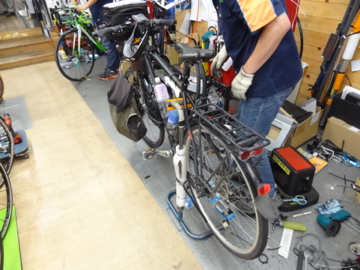 ... And this is exactly what I could do in Okayama. There was only on bicycle shop which was professional enough to have all the parts I needed. They did an excellent job in just an hour and after that I could cycle at least twice as fast as before.
... And this is exactly what I could do in Okayama. There was only on bicycle shop which was professional enough to have all the parts I needed. They did an excellent job in just an hour and after that I could cycle at least twice as fast as before.
While waiting for the bike to be ready, I wanted to have lunch somewhere, though soon I found out that there is actually no restaurant in Okayama which is open between 3pm and 6pm. I thought Japanese people work all the time but maybe this culture is only in Tokyo. At least I could find convenience stores nearby. They are anyway 24/7 open.
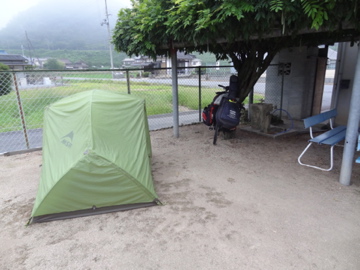 It's forbidden to put a tent in a public space in Europe in general, especially in Germany. In Asia, probably they do not watch it very carefully but it's quite dangerous to camp in nature. The very nice thing in Japan is, you can camp everywhere and the police cannot catch you at all, unless there's someone complaining. And there's always water nearby. I was in the middle of a forest and the infrastructure of the village I found was perfect.
It's forbidden to put a tent in a public space in Europe in general, especially in Germany. In Asia, probably they do not watch it very carefully but it's quite dangerous to camp in nature. The very nice thing in Japan is, you can camp everywhere and the police cannot catch you at all, unless there's someone complaining. And there's always water nearby. I was in the middle of a forest and the infrastructure of the village I found was perfect.
Silence. In contrast to Chinese streets, there was no car, no lorry in the night. The sky was perfectly clear and the air was clean. The nature of Japan was completely different from what I knew when I was living in this country.
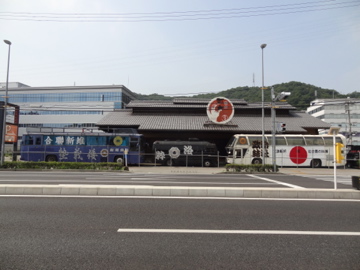 Compared with other Asian countries, Japan is not a very nationalistic country, even though the people are maybe not very open towards foreigners. However, there are still some religious groups (?) there, like NPD of Germany. When I was a kid, I could sometimes see cars like them on the photo on the streets with a lot of propaganda of whatever, I don't know exactly what it was. It's a pity that it is not as often seen as before.
Compared with other Asian countries, Japan is not a very nationalistic country, even though the people are maybe not very open towards foreigners. However, there are still some religious groups (?) there, like NPD of Germany. When I was a kid, I could sometimes see cars like them on the photo on the streets with a lot of propaganda of whatever, I don't know exactly what it was. It's a pity that it is not as often seen as before.
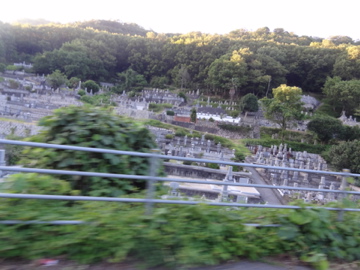 There are two metropolitan cities in Japan: Tokyo and Osaka. Tokyo is by far the biggest, not only in Japan, but also in the world (though depending on the definition). But Osaka is still a great metropolis. Anyway, when I was nearing Osaka, especially starting around Kobe, I could directly sense difficulties in big cities. I could cycle maybe for 10 or 20 meters and there was always a traffic light. I don't know what my bicycle weighs but stop and go was not very easy for me in this moment. Besides, sometimes there was no way for bikes except for underpasses. I could take my bike there but of course it was forbidden to cycle there (though there were people cycling through. The rules for bikes are not as much respected as those for cars in Japan).
There are two metropolitan cities in Japan: Tokyo and Osaka. Tokyo is by far the biggest, not only in Japan, but also in the world (though depending on the definition). But Osaka is still a great metropolis. Anyway, when I was nearing Osaka, especially starting around Kobe, I could directly sense difficulties in big cities. I could cycle maybe for 10 or 20 meters and there was always a traffic light. I don't know what my bicycle weighs but stop and go was not very easy for me in this moment. Besides, sometimes there was no way for bikes except for underpasses. I could take my bike there but of course it was forbidden to cycle there (though there were people cycling through. The rules for bikes are not as much respected as those for cars in Japan).
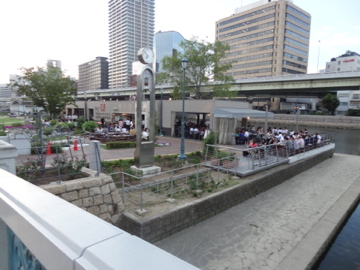 Just as many cities in Japan, Osaka is directly at the sea. There are, therefore, a lot of rivers going through the city. It's always a good idea to cycle along a river but in the case of Osaka, it was virtually impossible. Nevertheless, there were still some attractions on the river banks and in contrast to the people in Tokyo, they can apparently enjoy it much more in Osaka. Osaka is also a very famous city for this more humane aspect, not like Tokyo where people only work :)
Just as many cities in Japan, Osaka is directly at the sea. There are, therefore, a lot of rivers going through the city. It's always a good idea to cycle along a river but in the case of Osaka, it was virtually impossible. Nevertheless, there were still some attractions on the river banks and in contrast to the people in Tokyo, they can apparently enjoy it much more in Osaka. Osaka is also a very famous city for this more humane aspect, not like Tokyo where people only work :)
It's getting more and more difficult to find a host in Japan, but fortunately, my father's sister lived there, even though I completely forgot to take a photo of the family. I saw them about 20 years ago last time. It's not like we have a bad relation but it's fairly normal in Japan that the families cannot see each other for a long time mainly because of work and high transportation cost.
20 years is a long time. I realized this fact by not remembering anything at all in this place.
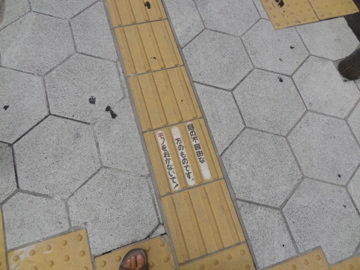 I decided to stay in Osaka a day more. I know exactly where I am going to be in the following days after all (if it does not rain...). My aunt's family was busy so I went out all alone.
I decided to stay in Osaka a day more. I know exactly where I am going to be in the following days after all (if it does not rain...). My aunt's family was busy so I went out all alone.
While walking on the street, there was something which came to my mind: this yellow blocks with bumps are designated for blind people. If you come from Japan, you might wonder, reading this phrase, why I wrote it at the first place. It's because it does not exist in Europe. And for Europeans, it might be a surprise that it exists literally everywhere in Japan.
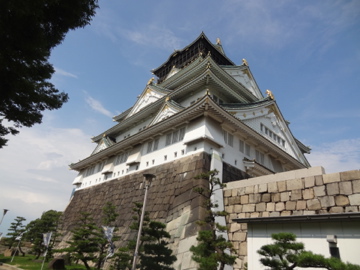 I was here in Osaka three years ago (though I did not visit my aunt at that time). And I have already seen a lot of touristic attractions there. Therefore, I just simply walked around to see what's going on in the city and saw the same attractions, too. This is the so called Osaka-jo, the castle of Osaka. Historically this is one of the most important castles of Japan, but now they renovated it from inside and with all the modern stuff, like an elevator, it created only distaste of those who would have enjoyed the atmosphere of the castle. Japanese are too materialistic.
I was here in Osaka three years ago (though I did not visit my aunt at that time). And I have already seen a lot of touristic attractions there. Therefore, I just simply walked around to see what's going on in the city and saw the same attractions, too. This is the so called Osaka-jo, the castle of Osaka. Historically this is one of the most important castles of Japan, but now they renovated it from inside and with all the modern stuff, like an elevator, it created only distaste of those who would have enjoyed the atmosphere of the castle. Japanese are too materialistic.
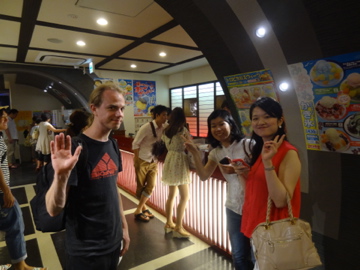 Actually there was one of my friends, Hendrik, who came to Japan from Germany for my arrival there. We know each other for quite a long time but he had never been in Japan before. At the same time, I had a friend, Wakako, whom I knew from my stay in Lyon. There was pretty much nothing to do for Hendrik and me (and of course not for Wakako who lives in Osaka). However, there's always something to do in Japan. Karaoke, for example. Actually Hendrik and I have done it several times in Goettingen, which was every time a big success, but it was the first time for him to try the real Japanese karaoke. It was quite a success. I knew that. hihi
Actually there was one of my friends, Hendrik, who came to Japan from Germany for my arrival there. We know each other for quite a long time but he had never been in Japan before. At the same time, I had a friend, Wakako, whom I knew from my stay in Lyon. There was pretty much nothing to do for Hendrik and me (and of course not for Wakako who lives in Osaka). However, there's always something to do in Japan. Karaoke, for example. Actually Hendrik and I have done it several times in Goettingen, which was every time a big success, but it was the first time for him to try the real Japanese karaoke. It was quite a success. I knew that. hihi
Osaka-Nagoya
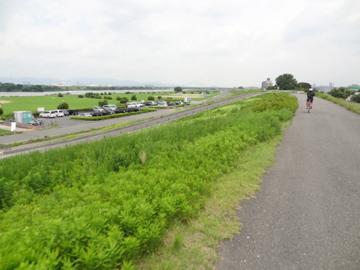 The weather started to be bad following day. I wanted to see one of the biggest festivals of Japan, Gion Matsuri, in Kyoto. The easiest way to go there is via Yodogawa, which is a huge river going through Kyoto and Osaka. And it was supposed to be a very comfortable road for cyclists, which turned out to be partially true, since my baggage was simply too big and I could not really go through the fences which are intended to repel motor bikes. The number of fences was incredible. I have to say, this is a very Japanese way of forbidding something. Actually, they are the people who follow the rules the most strictly and even if there wouldn't be a fence, probably there wouldn't be too many problems anyway. I don't know whether the benefit they have by making these fences is more than the damage they create...
The weather started to be bad following day. I wanted to see one of the biggest festivals of Japan, Gion Matsuri, in Kyoto. The easiest way to go there is via Yodogawa, which is a huge river going through Kyoto and Osaka. And it was supposed to be a very comfortable road for cyclists, which turned out to be partially true, since my baggage was simply too big and I could not really go through the fences which are intended to repel motor bikes. The number of fences was incredible. I have to say, this is a very Japanese way of forbidding something. Actually, they are the people who follow the rules the most strictly and even if there wouldn't be a fence, probably there wouldn't be too many problems anyway. I don't know whether the benefit they have by making these fences is more than the damage they create...
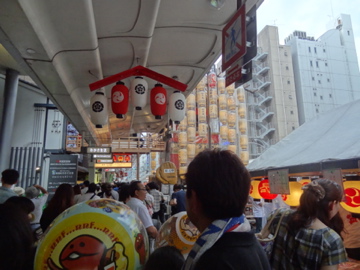 When I arrived in Kyoto, it started to rain. It was almost in the moment where I decided to stop cycling and go on foot. Gion was just in front of me.
When I arrived in Kyoto, it started to rain. It was almost in the moment where I decided to stop cycling and go on foot. Gion was just in front of me.
As a tourist with little luggage, it might be an interesting festival. In my case it was a little bit more complicated. I could not even go directly into the festival. It was simply way too crowded. What an irony that I happen to be just in the vicinity of Gion Matsuri which I have never seen in my life and I'm not going there...
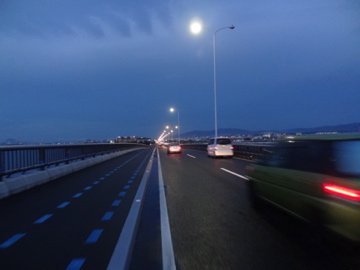 The largest lake of Japan, Shigako. It is probably one of the smallest of one country's largest lakes in the world. It became very famous for its pollution several years ago but I could not see it directly from the bridge over it. I could put my tent nearby in a park.
The largest lake of Japan, Shigako. It is probably one of the smallest of one country's largest lakes in the world. It became very famous for its pollution several years ago but I could not see it directly from the bridge over it. I could put my tent nearby in a park.
In the night, though, there was a group of young people who started fireworks in the same park. It did not matter to me too much (or rather, it surprised me that it did not matter to THEM that I was sleeping there) and there were police in the end. After the kids went back home, I was questioned by the police. I knew that I would not have a problem with the Japanese police (they have for sure a weaker status than in Europe). It is anyway quite nice that I can put my tent everywhere, so that I could just talk to the police as I wanted, like about Europe or what I am going to do etc.
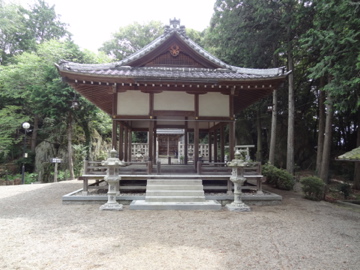 After Osaka, I decided to stay inside Japan (which is anyway not very far away from the coast line), because there were too many cars otherwise. The road connecting Osaka and Tokyo was called Tokai-do and one of the main ancient route, if not THE main route. That's the reason.
After Osaka, I decided to stay inside Japan (which is anyway not very far away from the coast line), because there were too many cars otherwise. The road connecting Osaka and Tokyo was called Tokai-do and one of the main ancient route, if not THE main route. That's the reason.
I thought that there wouldn't be so much going on in the inland of Japan but in reality there were still quite many people there. At the same time, I could enjoy the nature of Japan, which has one of the highest forest concentration in the world.
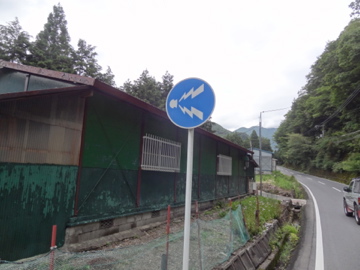 I made my driver's lisence in Germany. Sometimes there are signs that I do not understand at all, for example this one. Do you know what it means? At first I thought it was something like "hey! you are too noisy! Be quiet!". Obviously though, it wasn't the case but it probably means something like "honk!". I'm sure that this sign does not exist in many countries in the world. And guess why.
I made my driver's lisence in Germany. Sometimes there are signs that I do not understand at all, for example this one. Do you know what it means? At first I thought it was something like "hey! you are too noisy! Be quiet!". Obviously though, it wasn't the case but it probably means something like "honk!". I'm sure that this sign does not exist in many countries in the world. And guess why.
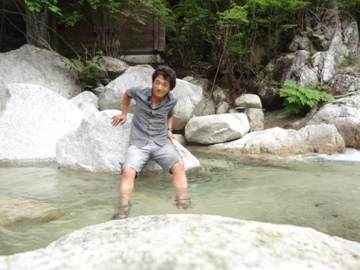 I have mentioned so often but I must say it again: the nature of Japan was much more beautiful than I had thought. I could confirm it once again by going through the mountains between Osaka and Nagoya. There, I could see a lot of rivers in the middle of forest. It's not always possible to get down there since usually the rivers go widely under the road but at some points I could get inside. Unfortunately, this part of Japan is distinctly cooler than the metropolitan cities but still it was nice to get into the water. And of course it was completely clean and clear. I'm almost ashamed of not being able to take a better photo which would have shown the real landscape there.
I have mentioned so often but I must say it again: the nature of Japan was much more beautiful than I had thought. I could confirm it once again by going through the mountains between Osaka and Nagoya. There, I could see a lot of rivers in the middle of forest. It's not always possible to get down there since usually the rivers go widely under the road but at some points I could get inside. Unfortunately, this part of Japan is distinctly cooler than the metropolitan cities but still it was nice to get into the water. And of course it was completely clean and clear. I'm almost ashamed of not being able to take a better photo which would have shown the real landscape there.
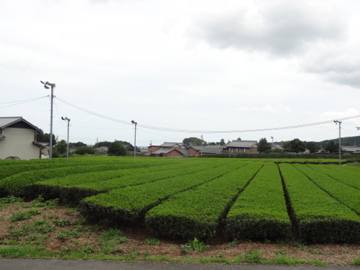 The agriculture of Japan almost died out when we started to trade with the United States and China. However, there is still some stuff going on and one of the examples is here, green tea. Not exactly this region but around here it is quite famous for good tea. And I surmise that you have never directly seen green tea. This kind of landscape can be seen everywhere in Japan.
The agriculture of Japan almost died out when we started to trade with the United States and China. However, there is still some stuff going on and one of the examples is here, green tea. Not exactly this region but around here it is quite famous for good tea. And I surmise that you have never directly seen green tea. This kind of landscape can be seen everywhere in Japan.
After the green tea field, there was a huge rice field. Not everywhere is like Tokyo, fortunately :)
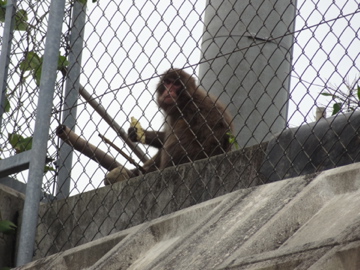 Not everywhere is like Tokyo, is as true as it sounds, especially because here, I could see apes, in the middle of nowhere. Actually there wasn't that much nature there anymore, or maybe because there was more civilization there, there apes running around. Anyway, these cheeky beasts were hopping around with foods which they clearly stole from humans. Probably the people in this region do not so much care about it. They just exist, as we do. That's all :)
Not everywhere is like Tokyo, is as true as it sounds, especially because here, I could see apes, in the middle of nowhere. Actually there wasn't that much nature there anymore, or maybe because there was more civilization there, there apes running around. Anyway, these cheeky beasts were hopping around with foods which they clearly stole from humans. Probably the people in this region do not so much care about it. They just exist, as we do. That's all :)
By the way, you know that sometimes there are things that you would never expect happen. It was the case, when I was approaching Nagoya. And I have to say, I really did not know what to do in this moment.
The whole stuff happened when I was at Lawson, which is just a convenience store. I was happy that I'd be able to arrive in Nagoya while it's still bright outside. I checked out the email and started to cycle again.
Two hours later, I was at Lawson again. And I found out: I had lost my wallet.
Usually I don't have the habit to leave my wallet outside but since the beginning of Japan, I was much less cautious about everything. Actually I also forgot my camera in the subway of Osaka, which could be found immediately when I went back to the station where I lost it. I must be more then grateful to the person who took it to the control center. This time, I had around 400 dollars in my wallet. And I knew that I had lost it at Lawson two hours ago.
I cycled back with all my energy, ignoring as many traffic lights as possible, leaving passers by wondering what a rude guy there was. I could not care about it. I just had to go back to the Lawson.
An hour later, I arrived there. The wallet was not there. And the employees did not know anything about it.
In my depression, I went to the nearest police station, knowing there was way too much money in it to be able to be found. What a disaster, what a misery and above all, what a shame...
Do you know where I come from? Maybe geographically, at least as for me, there was nothing more than that. And I know that there's Sony, Toyota, Yamaha and so many more brands in Japan. With all the diligence and politeness, Japan has become such a famous country. And there's so much and that's the end? I would have said yes. And the answer is no. What do you feel like to be a Japanese? You'll never figure out how proud I was to be born in this country, after experiencing the greatest moment there: My wallet was at the police station, with all my money inside.
And yes, this is Japan. They may someday lose all their brands and fortune, but there'll certainly be remaining something much more important than that. And I'll forever be grateful for being born and educated in this country, without being a nationalist.
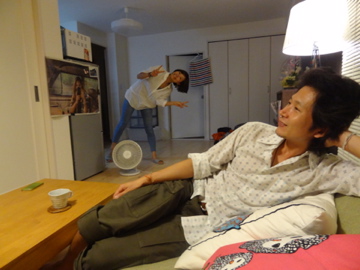 It was late in the evening, when I arrived at Miki's place. Actually I hosted her in Lyon at the beginning of my stay there. At that time, she was traveling around the world with her boy friend, Shinji. It was not what instigated my world trip but they motivated me even more at that time. There are not many Japanese who travel around the world (because of the language?) so I found it quite interesting to listen to their stories. They were saying that they miss it but I got the feeling that they were still happy there. Maybe the travel made them feel much better. It would be great if I could be also like them.
It was late in the evening, when I arrived at Miki's place. Actually I hosted her in Lyon at the beginning of my stay there. At that time, she was traveling around the world with her boy friend, Shinji. It was not what instigated my world trip but they motivated me even more at that time. There are not many Japanese who travel around the world (because of the language?) so I found it quite interesting to listen to their stories. They were saying that they miss it but I got the feeling that they were still happy there. Maybe the travel made them feel much better. It would be great if I could be also like them.
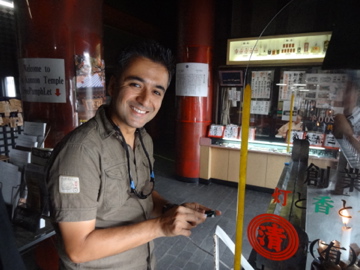 In a trip like this, there are things that you can expect very well, and there are also things that you would never expect. This unexpectedness was exactly the case, when I looked at Facebook, and found out that Yalcin, who hosted me in Samsun, Turkey, was in Japan. And not only in Japan, but in Nagoya. I immediately contacted him and set up a tour around Nagoya together. Actually he had been staying in Nagoya for around a week and had seen pretty much everything there, but it was still nice to walk around with him there, since it was not that easy for him to talk to the people. I'm sorry that the English language is not as widespread as it should be there...
In a trip like this, there are things that you can expect very well, and there are also things that you would never expect. This unexpectedness was exactly the case, when I looked at Facebook, and found out that Yalcin, who hosted me in Samsun, Turkey, was in Japan. And not only in Japan, but in Nagoya. I immediately contacted him and set up a tour around Nagoya together. Actually he had been staying in Nagoya for around a week and had seen pretty much everything there, but it was still nice to walk around with him there, since it was not that easy for him to talk to the people. I'm sorry that the English language is not as widespread as it should be there...
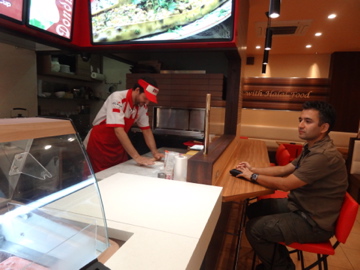 I have the feeling that there are much more Turks now in Japan than before. Or maybe it did not pull my attention until then. Anyway, I was also interested in the Turkish restaurants in Japan, so we decided to get into one of them. The first restaurant was run by an Egyptian guy. Why didn't he start an Egyptian restaurant...
I have the feeling that there are much more Turks now in Japan than before. Or maybe it did not pull my attention until then. Anyway, I was also interested in the Turkish restaurants in Japan, so we decided to get into one of them. The first restaurant was run by an Egyptian guy. Why didn't he start an Egyptian restaurant...
The second one was by Turkish guys. They were really like those I met in Turkey. I can imagine that the life in Japan is too harsh for them, with their open mindedness and frankness. It was nice to see this very different atmosphere again.
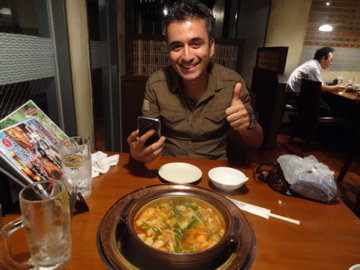 I'm only talking about foods but in the evening, after having looked for a good restaurant for quite a moment, we found a restaurant, that I did not know before but I could find everywhere this time. "Aka to shiro" (=red and white) was the name of the place. It is in principle a nabe-restaurant. I can strongly recommend it to you.
I'm only talking about foods but in the evening, after having looked for a good restaurant for quite a moment, we found a restaurant, that I did not know before but I could find everywhere this time. "Aka to shiro" (=red and white) was the name of the place. It is in principle a nabe-restaurant. I can strongly recommend it to you.
Nagoya-Fuji-Tokyo
I could have taken the road at the sea coast again after Nagoya, but I eventually decided to go to the inland again, which went through Toyota, simply because I did not want to take Tokai-do again.
 The mountains were of course not very easy after Toyota and this was exactly what I wanted.
The mountains were of course not very easy after Toyota and this was exactly what I wanted.
The people also seem to be different in this region, which can be seen, for example, by this street with tomatos, where was written "please take as many tomatos as you want". This kind of stuff is not that rare in Japan but of course not in big cities (even though the people are really not so hospitable in Japan...)
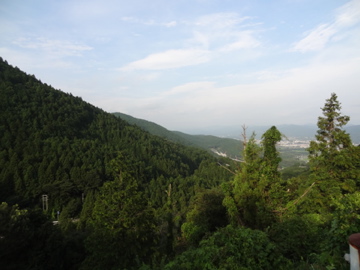 Since it went high and low all the time, I did not notice but apparently, I was at 500m when I was about to go down the mountains. It was a pity that it's almost impossible to go to Tokyo without going back to the sea coast.
Since it went high and low all the time, I did not notice but apparently, I was at 500m when I was about to go down the mountains. It was a pity that it's almost impossible to go to Tokyo without going back to the sea coast.
I had declared to be in Tokyo on 20th of July. The plan would have been perfect if at least it would have rained one day. Since it did not (as it almost never did in my entire trip), I had to change the route a little bit, namely going behind the Fuji, in which case it's also possible to avoid Tokai-do (please check out the route on google maps etc.)
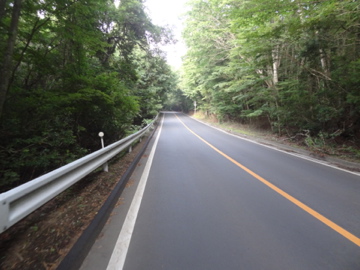 There are five very famous lakes just at the Fuji. I decided to take a small hotel there for the last day. Just as I thought, the road up there was simply going through the middle of a forest. Of course there were not too many cars there. Sometimes I could see some deers and probably it was very silent there, though I had Michael Jackson running in full volume. What a shame.
There are five very famous lakes just at the Fuji. I decided to take a small hotel there for the last day. Just as I thought, the road up there was simply going through the middle of a forest. Of course there were not too many cars there. Sometimes I could see some deers and probably it was very silent there, though I had Michael Jackson running in full volume. What a shame.
1000m above sea level was almost nothing to me at the end of the trip. It was even pleasant to ride to such a height. I will for sure miss it...
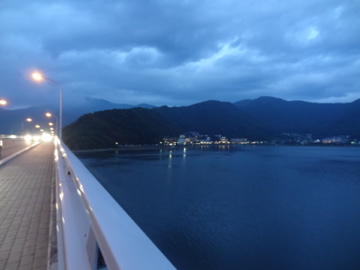 In the evening, I arrived at Kawaguchi-ko, one of the five lakes at the Fuji. There was one famous hostel there with a lot of young travelers. Unfortunately, I could not see the Fuji from there because of the weather. At least the lake was fairly beautiful, though it's said to be the ugliest of the five lakes.
In the evening, I arrived at Kawaguchi-ko, one of the five lakes at the Fuji. There was one famous hostel there with a lot of young travelers. Unfortunately, I could not see the Fuji from there because of the weather. At least the lake was fairly beautiful, though it's said to be the ugliest of the five lakes.
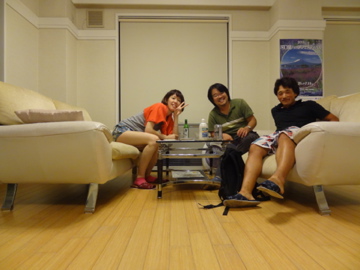 I could not have a lot of contacts with other travelers, but at least I could talk to some other Japanese travelers there. It was more like a chilling atmosphere with just a can of beer for me, celebrating the last day of my trip, which lasted more than 320 days.
I could not have a lot of contacts with other travelers, but at least I could talk to some other Japanese travelers there. It was more like a chilling atmosphere with just a can of beer for me, celebrating the last day of my trip, which lasted more than 320 days.
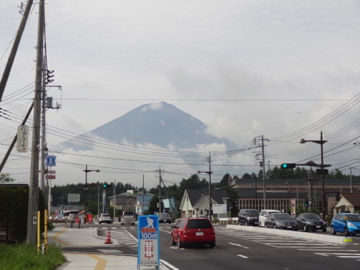 On the next day, which of course was the last day of my whole trip, I could see the Fuji in the morning, even though maybe the view was not the best (it's anyway difficult to see the top in a clear sky in summer). Well, it did not bother me too much.
On the next day, which of course was the last day of my whole trip, I could see the Fuji in the morning, even though maybe the view was not the best (it's anyway difficult to see the top in a clear sky in summer). Well, it did not bother me too much.
The road from Fuji to Tokyo is just going down, appropriately enough. I wanted to start the journey very early in the morning but in the end, we talked too much in the previous night and I could not get up early. After all, it's just important to go back home for this day, not more, not less.
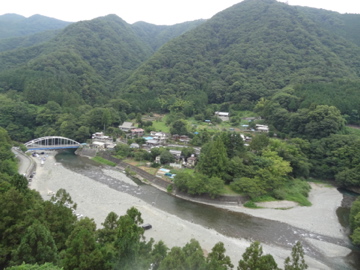 As I had expected, the road back to Tokyo was also incredibly beautiful. There are several routes there but the one I took was a very narrow street all the way down and therefore there were not too many cars, though it was going alongside the river (which you can see on the photo).
As I had expected, the road back to Tokyo was also incredibly beautiful. There are several routes there but the one I took was a very narrow street all the way down and therefore there were not too many cars, though it was going alongside the river (which you can see on the photo).
At 3pm, I entered my city, Machida, which for many people is not in Tokyo, though of course officially it is. I cycled along the national route 16, one of the most famous streets in Japan.
Until I turned the corner going to the main station, I could not recognize anything. However, when I did, I could for the first time in this entire trip cycle on the street I knew.
Passing at my old school, my favorite ice shop and all the convenience stores. Nothing changed.
At 4pm, I could see my parents and my dog at the end of the street. The wind was calm, the temperature not too high. Under the blue sky. There was probably much more to say for me. Maybe there was, maybe not. Just one phrase, for which I cycled for 323 days:
"I'm home."
Closing words
In this entire trip, this blog replaced my diary of more than ten years (with a lot of interruptions). This was exactly the reason why I wrote every single detail (both factual and interpreted) of each event. Especially since the beginning of Iran, I wrote a lot of political stuff.
The fact that I did not give up using my bicycle to travel will have certain effects on my attitude towards driving. Do you know what I checked first whenever I had the internet? It was the weather forecast, but it didn't matter whether it's gonna rain or not. It was the wind direction. I know how much more energy it costs to have a slight wind for several minutes. And I know how much more energy I need to cycle with 1kg more. I heard in the past that a person may die if you crash into a car driving with 25 km/h and you may think it's not that fast. Now I know, it's fast. You will know how fast it is if you cycle.
But how hard some problems may have been, I overcame them, because my body was built in such a way that I just supply energy and rest to my body and I could endlessly cycle. I know where it's coming from and I know whom I'm to grateful to. In this sense, one big obstacle which may or may not exist for other people was completely absent in my case from the beginning.
There's another big factor which allowed me to realize this whole trip: Japanese citizenship. After the WWII, the Japanese people built such a high reputation in the world with their peaceful and respectful manner, which not only spared me all the tedious work I would have had to go through. I don't know how grateful I can be to these people.
However, there is a group of people who only ruin the reputation in this country, one of whom recently said "comforts women were necessary in the WWII". This statement was made by a guy for whom the hardest time in life was to come back after a hard day at 11pm and find out that there's nothing anymore to eat in the fridge... or even less hard than this.
During this entire trip, I never threw away stuff in the street, even when I was in the middle of the desert and I knew that I would have to carry it more than 100km. Or I never stole anything even when I didn't have money and was dying of thirstiness. I never left foods on the table etc. These were all very basic. However, they were at the same time the strongest forces that held my mind together all the time. If I had broken my rules, I would have psychologically collapsed. People say "religious people are less prone to confess, even being tortured". I'm not religious, but I know how important to believe in something. Of course, maybe I simply did not experience the "real" hard moments in this trip, where I would have broken all my rules. But, this would have been the moment to say "I've crossed the limit. It's the end of this trip", just as we say "if we needed comfort women, that's exactly the reason why we may not start a war ever again..."
Now I just wonder, what the greatest legacy of the entire trip looks like... I have been strolling in my dream for more than three years and now I finally completed my first mission, though I'm still not sure if I've succeeded in changing anything in myself. I'll spend this whole summer trying to figure out what is the difference between the person I used to be and the person who's looking at me in the mirror in this moment.
However, at least there's one thing I could understand: it doesn't matter where you are in the world, after school, after university, you can simply go back home by bicycle, even if you are going to the other side of the earth.
It's a wonder that, in such a tiny tiny space, believing in their self justified ideology and unilateral justice, the man cannot stop destroying each other..
With a little tiny step, there was a world that I could sense, and with a little bit of courage there were people I could understand. With each of these steps I could clearly see this world of lonely people getting closer.
The ramifications of global problems may make you think that you must stick to existing global powers. It's up to you whether you want to suffocate in this complex thought or you try to make a step forward. In the end, the principle was much more simple for me: there's you, there's me and there's the world.
And nothing in between.
With all my gratitude and sincerity,
July 21st, 2013.
早稲田紀
 Hee Chang invited me to his place in Icheon. It was just 60km away or so. I plainly thought that it would be easy. Regarding the traffic, it was indeed incredibly easy. I have survived Central Asia and China. No country will be difficult anymore, I think. However, the geography of South Korea was not as simple as I wanted it to be. Besides the gears of my bicycle were now so used and worn, so I could not accelerate so much. I must change it in the next big city. I don't know why I didn't do it in Seoul although I was always conscious of this problem...
Hee Chang invited me to his place in Icheon. It was just 60km away or so. I plainly thought that it would be easy. Regarding the traffic, it was indeed incredibly easy. I have survived Central Asia and China. No country will be difficult anymore, I think. However, the geography of South Korea was not as simple as I wanted it to be. Besides the gears of my bicycle were now so used and worn, so I could not accelerate so much. I must change it in the next big city. I don't know why I didn't do it in Seoul although I was always conscious of this problem...
 Icheon was a very small city so it was very easy for me to find Heechang's house. The thing was in Seoul there was no one who seemed to be interested in my bicycle but the people looked stupefied when they saw my fully charged bicycle. This region seems to be kept from cyclists because usually they follow the Han to go to Busan. Nice to see such an unexplored place!
Icheon was a very small city so it was very easy for me to find Heechang's house. The thing was in Seoul there was no one who seemed to be interested in my bicycle but the people looked stupefied when they saw my fully charged bicycle. This region seems to be kept from cyclists because usually they follow the Han to go to Busan. Nice to see such an unexplored place!
 Since I had tasted the Korean BBQ the previous day, Heechang wanted to show me another aspect of the culinary culture of Korea. This looked pretty much the Japanese style but they have certainly many things in common, I suppose.
Since I had tasted the Korean BBQ the previous day, Heechang wanted to show me another aspect of the culinary culture of Korea. This looked pretty much the Japanese style but they have certainly many things in common, I suppose.
 You might know Japanese onsen but there is something similar in Korea, too, though in case of Korea the hot springs are not found everywhere. Icheon was so to speak one of the miracle spots. If you are German you probably do not have too many problems but if you are French, you might be a bit disturbed because all the people are completely naked there (which was actually the reason why I didn't take a photo inside...) The cool thing is, you can not only enjoy the onsen, but there is something called Jjimjilpang upstairs, which is a collection of different types of sauna, though the temperatures are much lower and you go there with clothes on. And usually people are lying in or outside these saunas. Actually this Jjimjilpangs are open 24/7 and costs only 10 dollars or so, so many Korean young people go there if they don't want to take a real hotel.
You might know Japanese onsen but there is something similar in Korea, too, though in case of Korea the hot springs are not found everywhere. Icheon was so to speak one of the miracle spots. If you are German you probably do not have too many problems but if you are French, you might be a bit disturbed because all the people are completely naked there (which was actually the reason why I didn't take a photo inside...) The cool thing is, you can not only enjoy the onsen, but there is something called Jjimjilpang upstairs, which is a collection of different types of sauna, though the temperatures are much lower and you go there with clothes on. And usually people are lying in or outside these saunas. Actually this Jjimjilpangs are open 24/7 and costs only 10 dollars or so, so many Korean young people go there if they don't want to take a real hotel.
 I knew the drinking culture of Korea pretty well but in the end, we didn't drink alcohol at all, which we all regretted more or less. Well, I'm sure that I'm coming back to Korea again so it's not really a tragedy, I think. The following morning anyway, it was raining... Korea was in the middle of the rainy season, I don't know until when. Lonlely Planet also explicitly says that it's not fun to go there these months. Anyway, it stopped at noon so I eventually decided to depart.
I knew the drinking culture of Korea pretty well but in the end, we didn't drink alcohol at all, which we all regretted more or less. Well, I'm sure that I'm coming back to Korea again so it's not really a tragedy, I think. The following morning anyway, it was raining... Korea was in the middle of the rainy season, I don't know until when. Lonlely Planet also explicitly says that it's not fun to go there these months. Anyway, it stopped at noon so I eventually decided to depart.
 Anyway, I started. It was slightly less hilly this time butstill it was not very easy to cycle.
Anyway, I started. It was slightly less hilly this time butstill it was not very easy to cycle.
 For the rest of the day, I thought the weather would stay more or less stable, until I had to go through one cloudburst. In Japan, it's usually more like it's raining all the time and there's no explosive moment but the rainy season of Korea seems to be always like this.
For the rest of the day, I thought the weather would stay more or less stable, until I had to go through one cloudburst. In Japan, it's usually more like it's raining all the time and there's no explosive moment but the rainy season of Korea seems to be always like this.
 I was thinking to take a Jjimjilpang somewhere on the way in the evening but I could not arrive in a big city at all. There were some motels on the way but I found it a bit stupid to stay there (just in case: a motel is not a brothel in Korea)
I was thinking to take a Jjimjilpang somewhere on the way in the evening but I could not arrive in a big city at all. There were some motels on the way but I found it a bit stupid to stay there (just in case: a motel is not a brothel in Korea)
 Since it was a restaurant, I also could have dinner. Before going to bed, I was watching TV. I noticed that there is no dubbing there, only subtitles. And whenever there are people in the news, not related to the current topic, this part is completely frosted so that they cannot be seen, like when they are showing a picture of a street with a lot of people or so. I don't know how important it is but this type of care is fairly prevalent in Japan, too, though I don't think this happens in China.
Since it was a restaurant, I also could have dinner. Before going to bed, I was watching TV. I noticed that there is no dubbing there, only subtitles. And whenever there are people in the news, not related to the current topic, this part is completely frosted so that they cannot be seen, like when they are showing a picture of a street with a lot of people or so. I don't know how important it is but this type of care is fairly prevalent in Japan, too, though I don't think this happens in China.
 I just put the photo of the place once again. It almost looked like a ghost house in the previous night but it's actually a very nice building. The weather was also getting better there.
I just put the photo of the place once again. It almost looked like a ghost house in the previous night but it's actually a very nice building. The weather was also getting better there.
 The infrastructure is extremely good in Korea. Sometimes even too good. As there is almost no one in the middle of Korea, I encountered a car maybe every five minutes or so? It was very calm during the whole day. And in a country where it is also extremely safe to cycle in the capital, I can do whatever acrobatics in the middle of the street and nothing happens. And in these circumstances, I was shocked to see a road for cyclists. I did not use it there because typically this kind of cycle road goes to somewhere else, but it stayed there I don't know for how many kilometers. I personally find it superfluous but I'm also a crazy guy to cycle on the highway in China and Koreans are maybe really serious about it.
The infrastructure is extremely good in Korea. Sometimes even too good. As there is almost no one in the middle of Korea, I encountered a car maybe every five minutes or so? It was very calm during the whole day. And in a country where it is also extremely safe to cycle in the capital, I can do whatever acrobatics in the middle of the street and nothing happens. And in these circumstances, I was shocked to see a road for cyclists. I did not use it there because typically this kind of cycle road goes to somewhere else, but it stayed there I don't know for how many kilometers. I personally find it superfluous but I'm also a crazy guy to cycle on the highway in China and Koreans are maybe really serious about it.
 I think in Korea the distance to one city is defined as the distance to the city hall of the city, which is in fact a very nice idea (not like in Italy...) and it's quite consistent. However, there are two types of signs. One is the big board like in the back of the photo (this one I think is usually the city hall) and the one at the side of the road (I don't know how this one works) and sometimes they have a significant difference. Clearly, in this photo, I can see that there isn't a 4km difference between these two plates.
I think in Korea the distance to one city is defined as the distance to the city hall of the city, which is in fact a very nice idea (not like in Italy...) and it's quite consistent. However, there are two types of signs. One is the big board like in the back of the photo (this one I think is usually the city hall) and the one at the side of the road (I don't know how this one works) and sometimes they have a significant difference. Clearly, in this photo, I can see that there isn't a 4km difference between these two plates.
 It was a very lovely sunny day. And you must know how beautiful Korea actually is. Particularly the water of the rivers. I don't know exactly where it's coming from but in such a mountainous country I don't think it has any pollution. Korea is anyway not a polluted country. Koreans complain about the air quality of Seoul but I found it quite clean there, too.
It was a very lovely sunny day. And you must know how beautiful Korea actually is. Particularly the water of the rivers. I don't know exactly where it's coming from but in such a mountainous country I don't think it has any pollution. Korea is anyway not a polluted country. Koreans complain about the air quality of Seoul but I found it quite clean there, too.
 The only one difficulty was with restaurants or shops. The road I took was not going through any village/town/city, even though it was not a highway. It's not a bad idea since this way, the people can completely avoid any kind of noise coming from the cars from outside. Anyway, I could find a place at 4pm to have lunch and could go further.
The only one difficulty was with restaurants or shops. The road I took was not going through any village/town/city, even though it was not a highway. It's not a bad idea since this way, the people can completely avoid any kind of noise coming from the cars from outside. Anyway, I could find a place at 4pm to have lunch and could go further.
 It looked like it was built recently. I found it extremely nice, but the way of building it appeared, to be honest, a little bit weird to me. As you see on the photos, there was simply no one on this road, even though it was a sunny day. Maybe the popularity is now getting more and more so it was an investment for the future? It was also quite difficult to get food supply on the way because all the cities were fairly far away from this road and it was not like I could leave the cycle road to go to a city and join it again after the city. It was more like I had to come back to the point again because there were really not so many possible exits/entries. Another weird thing was, this road sometimes goes up and down, pretty much without a reason. So I found it extremely difficult to cycle with all the luggage I had on my bicycle. It looked almost like it was built by someone who had never cycled before. Well, for sporty mountain bikers it probably doesn't matter so much
It looked like it was built recently. I found it extremely nice, but the way of building it appeared, to be honest, a little bit weird to me. As you see on the photos, there was simply no one on this road, even though it was a sunny day. Maybe the popularity is now getting more and more so it was an investment for the future? It was also quite difficult to get food supply on the way because all the cities were fairly far away from this road and it was not like I could leave the cycle road to go to a city and join it again after the city. It was more like I had to come back to the point again because there were really not so many possible exits/entries. Another weird thing was, this road sometimes goes up and down, pretty much without a reason. So I found it extremely difficult to cycle with all the luggage I had on my bicycle. It looked almost like it was built by someone who had never cycled before. Well, for sporty mountain bikers it probably doesn't matter so much
 There was still a good aspect on the otherside, too: there were plenty of places to put a tent. I just chose one place on the riverbank.
There was still a good aspect on the otherside, too: there were plenty of places to put a tent. I just chose one place on the riverbank.
 Following day, not only I felt horrible, but the weather was unpleasant, too. This was something that had been expected before and luckily enough, it never rained too long. Whenever it started to rain, I stayed under a bridge or in a café. There are really a lot of cafés in Korea. Wonderful!
Following day, not only I felt horrible, but the weather was unpleasant, too. This was something that had been expected before and luckily enough, it never rained too long. Whenever it started to rain, I stayed under a bridge or in a café. There are really a lot of cafés in Korea. Wonderful!
 The situation that the cycle road was very far away from the normal civilization did not change that much on this day. When I wanted to have lunch, I had to take a very long road to go to a city. And fortunately enough, I could have a bibimbap again. I'm not a kind of person who really enjoys eating (did I mention?) but bibimbap is different. I'm sure that this wave will come to Europe in the near future.
The situation that the cycle road was very far away from the normal civilization did not change that much on this day. When I wanted to have lunch, I had to take a very long road to go to a city. And fortunately enough, I could have a bibimbap again. I'm not a kind of person who really enjoys eating (did I mention?) but bibimbap is different. I'm sure that this wave will come to Europe in the near future.
 I arrived in a small city in the evening and took a room in a hotel. It was not very cheap and there was no internet there, but I really needed a good rest in this moment. Besides, it started to rain very hard in the evening. I don't think I would have been able to stay in my tent just like this. I could use the internet in a café nearby. When I ordered milk tea, they brought milk. Well, I needed the internet so this was not very important anyway... The owner was a very friendly guy, as many Koreans indeed are :)
I arrived in a small city in the evening and took a room in a hotel. It was not very cheap and there was no internet there, but I really needed a good rest in this moment. Besides, it started to rain very hard in the evening. I don't think I would have been able to stay in my tent just like this. I could use the internet in a café nearby. When I ordered milk tea, they brought milk. Well, I needed the internet so this was not very important anyway... The owner was a very friendly guy, as many Koreans indeed are :)
 The effect of the heavy rain of the previous day was tremendous. I don't know what this should look like usually but when I was there it was at least 1m deep. However, this kind of stuff does not present too many problems in Korea since wherever problems might arise, there are always solutions indicated.
The effect of the heavy rain of the previous day was tremendous. I don't know what this should look like usually but when I was there it was at least 1m deep. However, this kind of stuff does not present too many problems in Korea since wherever problems might arise, there are always solutions indicated.
 I came back to the cycling road again and as before, there was pretty much no one there, neither civilization, just nature and some houses.
I came back to the cycling road again and as before, there was pretty much no one there, neither civilization, just nature and some houses.
 And after four days, I finally arrived in Busan. Busan is by the way the second biggest city of Korea and culturally fairly distinct from Seoul. People in Seoul told me the people in Busan speak a very different dialect. I don't know how different it is but it appeared quite similar to that of Seoul to me.
And after four days, I finally arrived in Busan. Busan is by the way the second biggest city of Korea and culturally fairly distinct from Seoul. People in Seoul told me the people in Busan speak a very different dialect. I don't know how different it is but it appeared quite similar to that of Seoul to me.
 I knew about where to go to see my host, Jay. And when I was nearby, I just turned on the wi-fi and of course I had the internet there, as always in Korea.
I knew about where to go to see my host, Jay. And when I was nearby, I just turned on the wi-fi and of course I had the internet there, as always in Korea.
 The modern culture of Korea made me think of Japan a lot. We were waiting for one of Jay's friend and I walked around a little bit. There was one big arcade center nearby. There were some arcade centers in China as well but they looked much older. Here in Korea, they had probably the same machines as in Japan, though much cheaper there (just a quarter of what you pay in Japan). I just wondered how Koreans deal with the language since there was obviously no translation for most of the machines... Maybe this is the reason why there are so many Koreans who understand Japanese :)
The modern culture of Korea made me think of Japan a lot. We were waiting for one of Jay's friend and I walked around a little bit. There was one big arcade center nearby. There were some arcade centers in China as well but they looked much older. Here in Korea, they had probably the same machines as in Japan, though much cheaper there (just a quarter of what you pay in Japan). I just wondered how Koreans deal with the language since there was obviously no translation for most of the machines... Maybe this is the reason why there are so many Koreans who understand Japanese :)
 Koreans drink a lot. I know it from Germany. And I knew a lot of stuff but eventually I didn't have an opportunity anywhere. However, this guy, Jay, was quite a boozer, together with the fact that he's jobless at the moment. And it was a Friday, which was another good reason to go drinking.
Koreans drink a lot. I know it from Germany. And I knew a lot of stuff but eventually I didn't have an opportunity anywhere. However, this guy, Jay, was quite a boozer, together with the fact that he's jobless at the moment. And it was a Friday, which was another good reason to go drinking.
 Koreans eat many different things, such as dogs cats etc. Something I didn't expect to be in the bar was silkworms... Japanese used to eat them like a century ago (which I learnt from the history class) but Koreans still eat them. Of course it was the first time for me to taste it. I would say, it didn't have any taste. By the way, if you say "it does not have a taste" in Korean literally, it means "it tastes bad". You must say "it does not have ANY taste". So confusing...
Koreans eat many different things, such as dogs cats etc. Something I didn't expect to be in the bar was silkworms... Japanese used to eat them like a century ago (which I learnt from the history class) but Koreans still eat them. Of course it was the first time for me to taste it. I would say, it didn't have any taste. By the way, if you say "it does not have a taste" in Korean literally, it means "it tastes bad". You must say "it does not have ANY taste". So confusing...
 There was another round in a different bar (three bars in total... I was dying). Fortunately, the ship for Japan was in the evening. So we slept like until noon and strolled around the city together. As Busan is the second biggest city in Korea, it has also a long history and culture there. This very nice Buddhist (?) temple, for example. Things like this are everywhere in the city, just as in Japan, immersed in the middle of the local culture.
There was another round in a different bar (three bars in total... I was dying). Fortunately, the ship for Japan was in the evening. So we slept like until noon and strolled around the city together. As Busan is the second biggest city in Korea, it has also a long history and culture there. This very nice Buddhist (?) temple, for example. Things like this are everywhere in the city, just as in Japan, immersed in the middle of the local culture.
 There's something that I personally call "bookstore dating" in Japan. Especially young couples go to a bookstore for dating. This is quite characteristic for Japan since there are so many bookstores and the people are relatively interested in books. In Korea, on the other hand, there's internet café dating. There are sometimes spaces for couples in the internet cafés and I don't know what they do but they can use them to date. Welcome to Korea :)
There's something that I personally call "bookstore dating" in Japan. Especially young couples go to a bookstore for dating. This is quite characteristic for Japan since there are so many bookstores and the people are relatively interested in books. In Korea, on the other hand, there's internet café dating. There are sometimes spaces for couples in the internet cafés and I don't know what they do but they can use them to date. Welcome to Korea :)
 I know that Japanese people hate to touch anything at the toilet. The Koreans have apparently the same habitude. The light blue object over the sink is a soap, a very normal one, but suspended by a stick so that you don't need to touch anything else. I don't know how important it is...
I know that Japanese people hate to touch anything at the toilet. The Koreans have apparently the same habitude. The light blue object over the sink is a soap, a very normal one, but suspended by a stick so that you don't need to touch anything else. I don't know how important it is...
 Busan had a little bit different atmosphere than Seoul. It was more like an old city, just like Tokyo and Osaka. But still there was a lot of modern stuff, like cafés for example. Just as Japanese ones, they do not offer a cup of simple coffee, but elaborated parfaits, in a tiny very nice space. They are quite different from the ones in Europe but I like them both.
Busan had a little bit different atmosphere than Seoul. It was more like an old city, just like Tokyo and Osaka. But still there was a lot of modern stuff, like cafés for example. Just as Japanese ones, they do not offer a cup of simple coffee, but elaborated parfaits, in a tiny very nice space. They are quite different from the ones in Europe but I like them both.














































